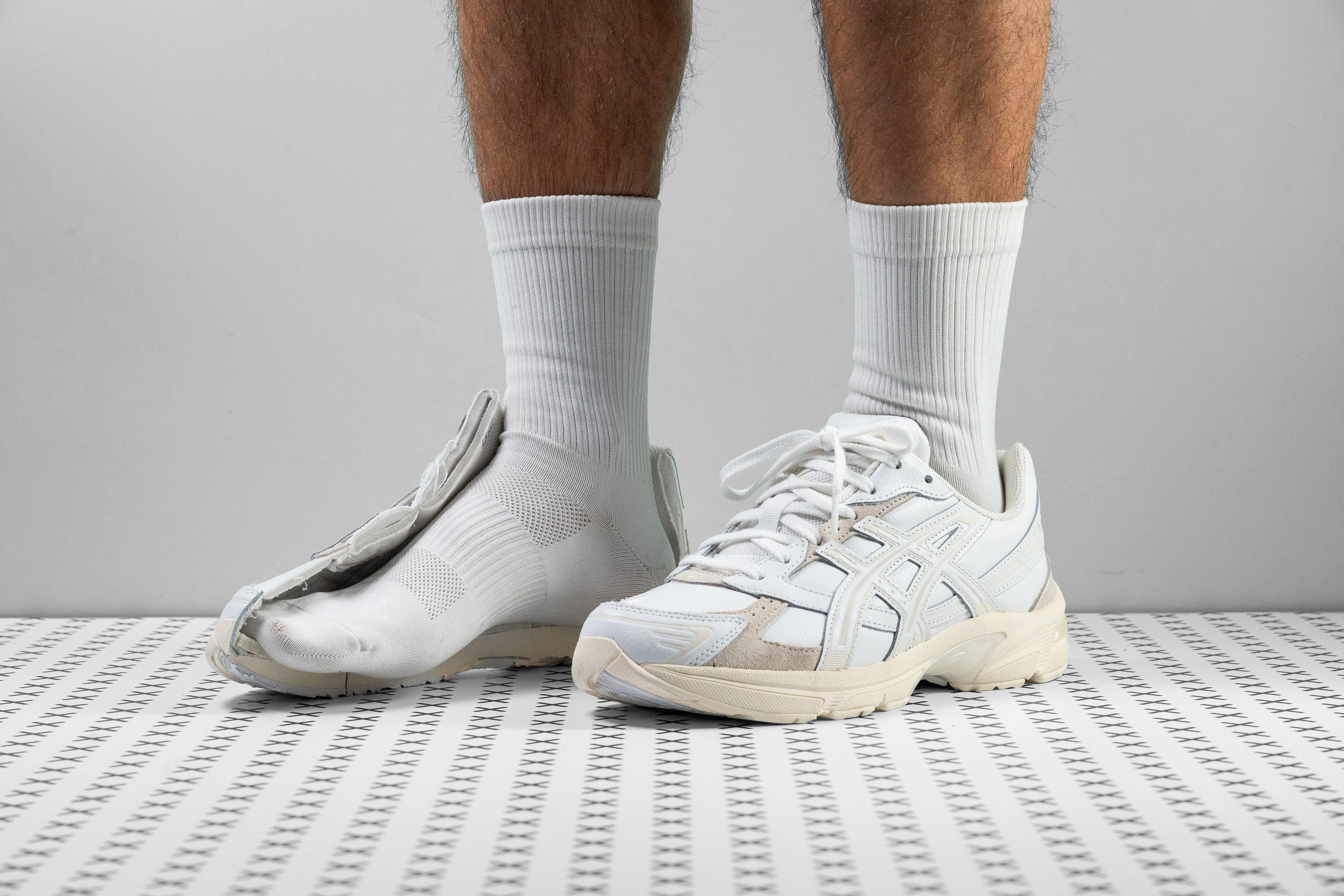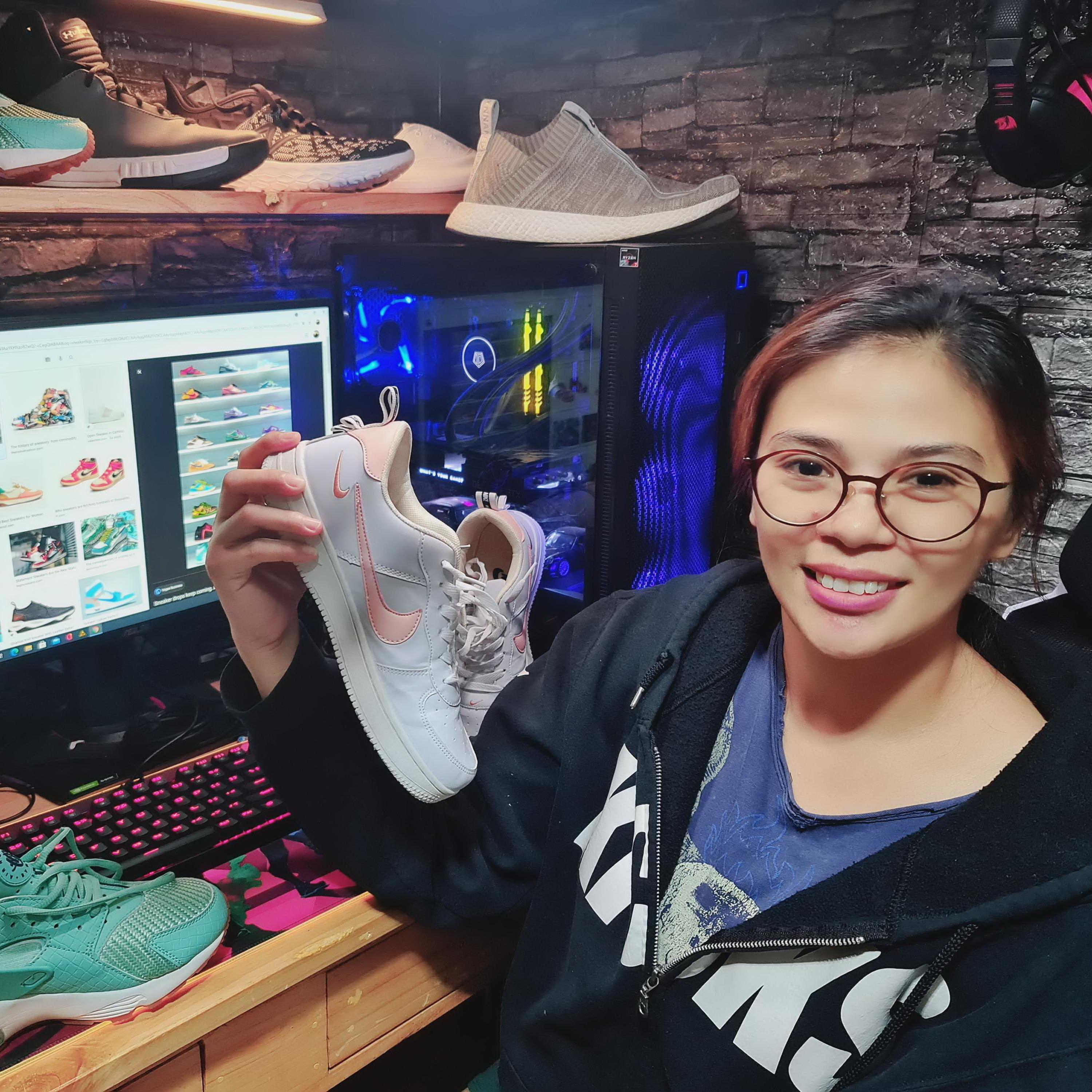Our verdict
- Top pick in best trainers
- Top pick in best ASICS trainers
Pros
- Comfortable for all-day wear
- Stable platform
- Top-notch materials
- Excellent craftsmanship
- Supportive foothold
- Grippy, running-inspired outsole
- Feels lightweight with a padded interior
- Roomy at the big toe
- Real suede and leather
- Cool 90s dad shoes retro vibe
- Cool 90s dad shoes retro vibe
Cons
- The leather version lacks breathability
- Quite stiff
Audience verdict
- Top 5% in trainers
- Top 20% in Dad shoe reviews
- Top 3% most popular trainers
Comparison
The most similar trainers compared
+ + Add a shoe | |||||
|---|---|---|---|---|---|
| Audience score | 95 Superb! | 92 Great! | 90 Good! | 93 Great! | |
| Price | £115 | £100 | £110 | £160 | |
| Style | DadRetroSporty | RetroSportyFuturistic | RetroSporty | ClassicSportyFuturisticChunky | |
| Shock absorption | High | High | High | Moderate | |
| Energy return | Moderate | Moderate | Moderate | Moderate | |
| Traction | High | - | High | High | |
| Breathability | Warm | Breathable | Breathable | Moderate | |
| Weight lab | 12.9 oz / 366g | 10.3 oz / 292g | 10.6 oz / 301g | 15.1 oz / 427g | |
| Size | True to size | True to size | True to size | True to size | |
| Midsole softness | Soft | Balanced | Balanced | Soft | |
| Material | LeatherMesh | LeatherMesh | MeshSuede | MeshSuede | |
| Season | SpringFall | Summer | SpringFall | SpringFall | |
| Inspired from | Running | Running | Running | Running | |
| Width / fit | Medium | Medium | Medium | Medium | |
| Toebox width | Medium | Medium | Medium | Narrow | |
| Leather/suede quality | Real leather | - | Real suede | Real suede | |
| Toebox durability | Decent | Good | Decent | Decent | |
| Heel padding durability | Decent | Decent | Bad | Decent | |
| Outsole durability | Good | Good | Good | Good | |
| Heel stack lab | 32.3 mm | 29.7 mm | 35.0 mm | 37.3 mm | |
| Stiffness | Moderate | Flexible | Moderate | Moderate | |
| Tongue padding | Average | Average | Very thin | Average | |
| Drop lab | 10.0 mm | 9.0 mm | 10.0 mm | 11.3 mm | |
| Forefoot | 22.3 mm | 20.7 mm | 25.0 mm | 26.0 mm | |
| Removable insole | ✓ | ✓ | ✓ | ✓ | |
| Heel tab | None | None | None | None | |
| Torsional rigidity | Moderate | Moderate | Moderate | Moderate | |
| Heel counter stiffness | Moderate | Stiff | Moderate | Moderate | |
| Reflective elements | ✗ | ✗ | ✗ | ✓ | |
| Closure | Laces | Laces | Laces | Laces | |
| Top | Low top | Low top | Low top | Low top | |
| Ranking | #6 Top 5% | #33 Top 28% | #65 Bottom 46% | #21 Top 18% | |
| Popularity | #3 Top 3% | #30 Top 25% | #13 Top 11% | #1 Top 1% |
Who should buy
We believe this ASICS is the perfect match for:
- Sneakerheads who love retro-styled kicks with modern technologies.
- ASICS fans who love the old runners design but are looking for up-to-date comfort.
- Anyone who wants a stylish stability shoe to walk around town in autumn and winter.
- Picky shoe experts who won't settle for any less than a pair with top-notch quality, materials, and craftsmanship.
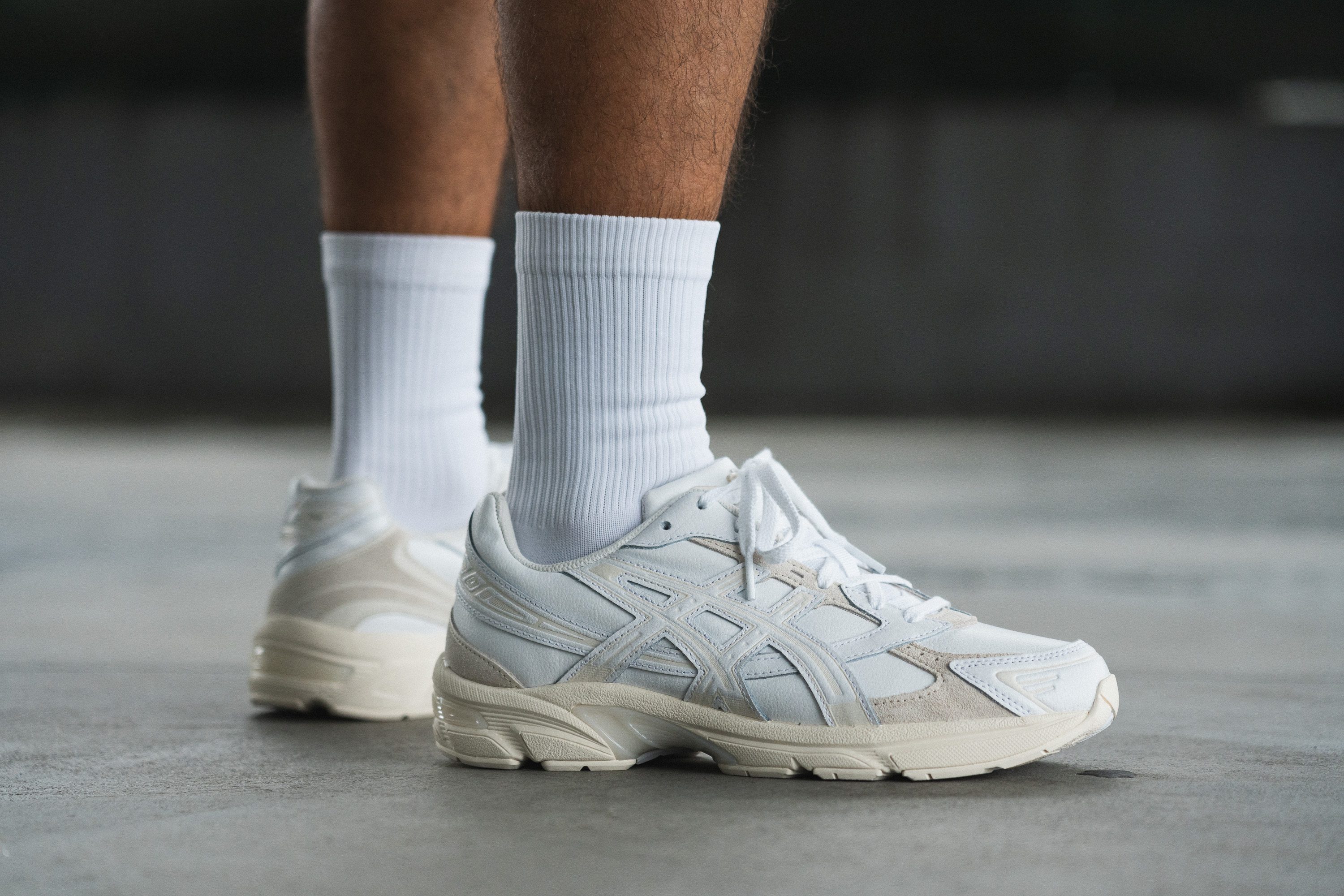
Who should NOT buy
Honestly, we didn't find many negative points in this shoe!
Despite having it endure our tough and hard wear and lab tests, it performed brilliantly. The only thing we can say is that this leather version it's definitely not a breathable pair, so if you wear it in the summer, your feet will (almost literally) be on fire. If you're looking for a well-ventilated pal for hot days in town and you're a big ASICS fan, we believe you should have a look at the ASICS Gel Lyte III.
If you need something more flexible but you don't want to give up on high-quality materials (and you don't mind changing brands again), Nike has got your back. The Air Max 2090 is a toughie with an Air Unit. Even though it's pricey, we believe it's totally worth a try. If you actually don't mind the materials that much and just want something flexible and affordable, in New Balance we trust. Have a look at the NB 480!
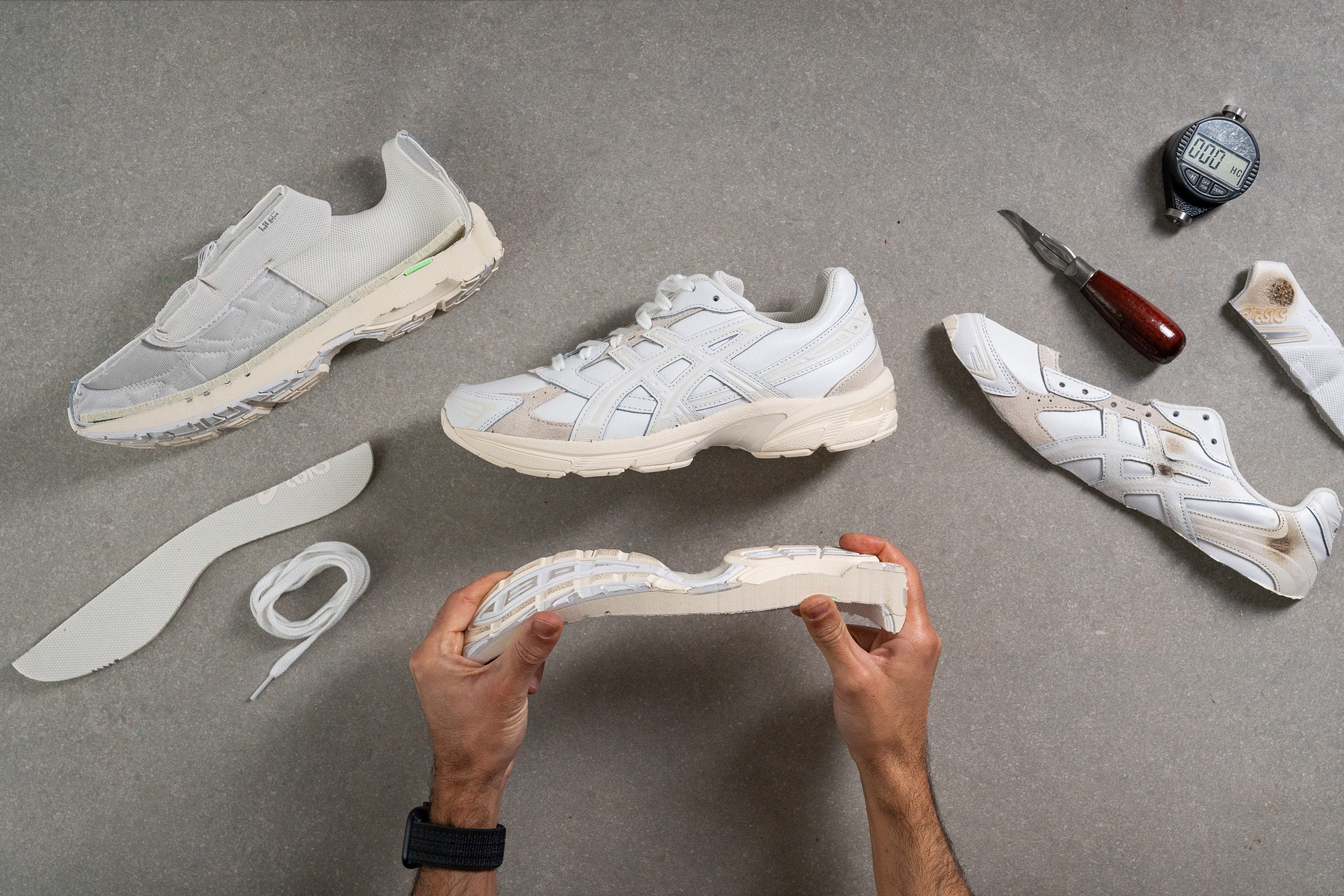
Cushioning
Stability? Oh, please. For such resistant and supportive shoes, being stable is a piece of cake!
Just by watching the video you'll most likely know, but we'll say it anyway: the Gel 1130 used to be a running stability shoe! This means its whole design focuses on you not losing your balance.
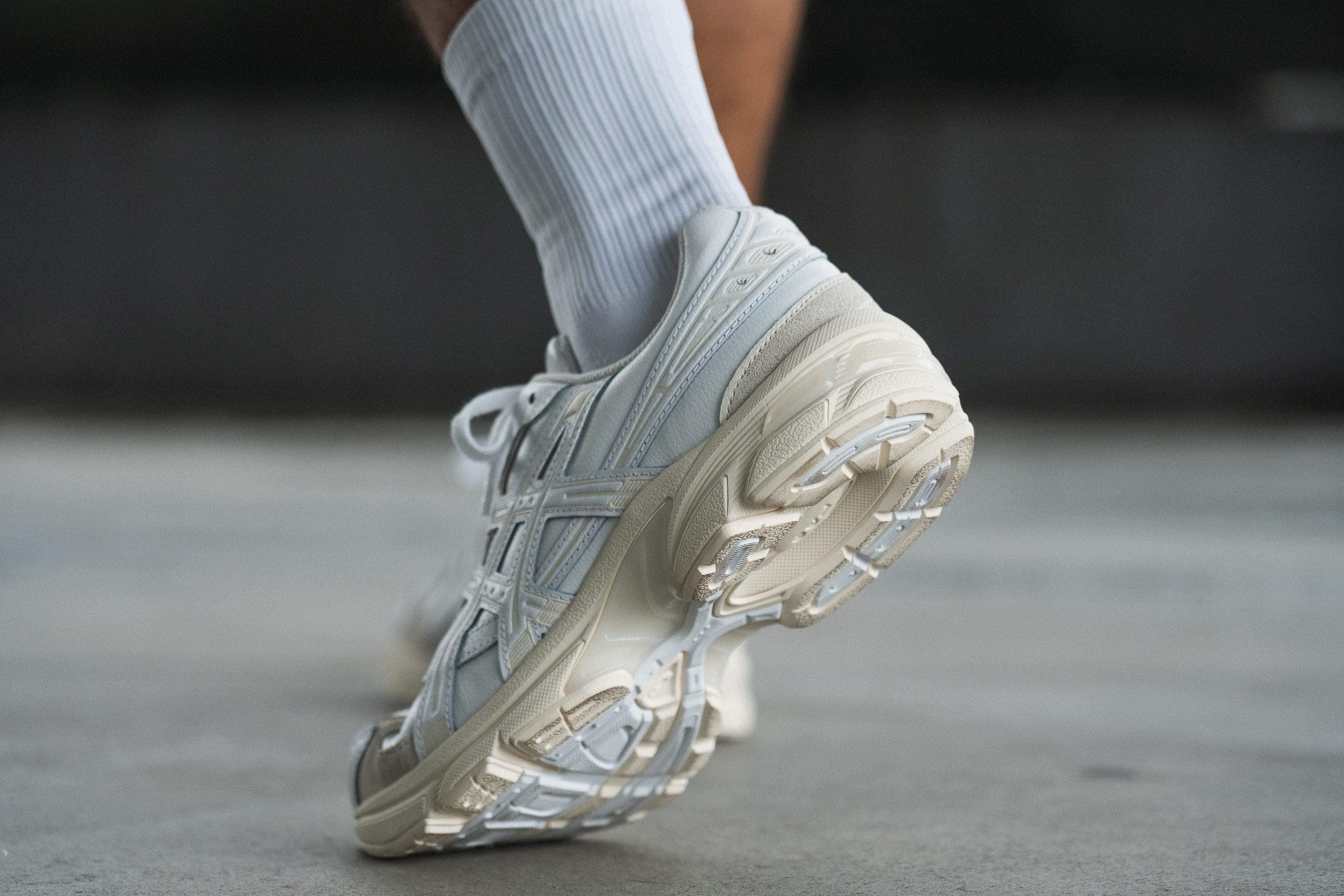
After our lab tests, we found out that it keeps and features the TRUSSTIC™ support system. This technology helped runners of the late 2000s improve their stability.
The S in the ASICS Gel 1130 stands for: "Stability".
Shock absorption
While it doesn't have the softest step-in feel, we found that the ASICS Gel 1130 offers solid impact protection for long hours of walking and standing.
Recording the shoe's shock absorption at 114 SA, we found it to be notably higher than the average of lifestyle trainers. This means that our feet and joints have to deal with less impact and are not getting tired so quickly.
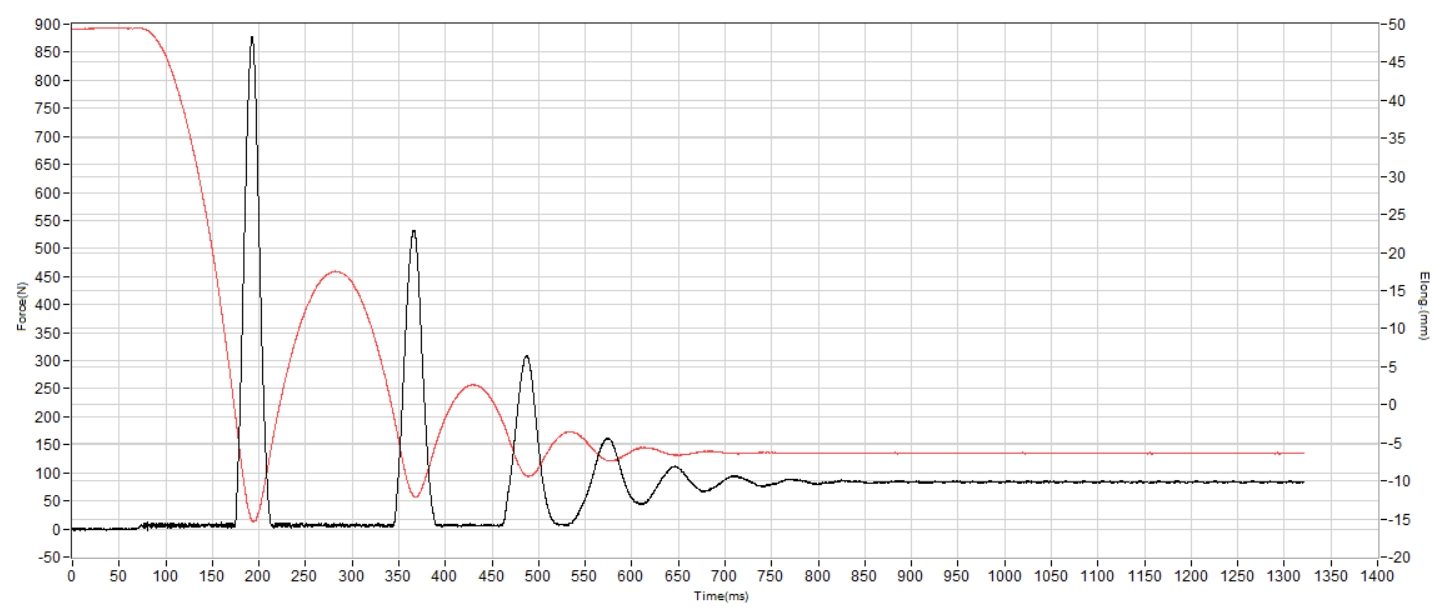
| Gel 1130 | 114 SA |
| Average | 89 SA |
Energy return
On the other hand, the Gel 1130 proved to be a low-rebound shoe that only gives 46% of the energy back to the foot. So don't expect a lot of pep in your step.
But the upside of this setup is a stable and planted base which is beneficial for people with overpronation and other conditions that call for a steadier underfoot experience.
| Gel 1130 | 45.6% |
| Average | 50.2% |
Heel stack
Just by having a look at it, you must've most likely guessed this shoe's midsole is just as thick as the average for trainers.
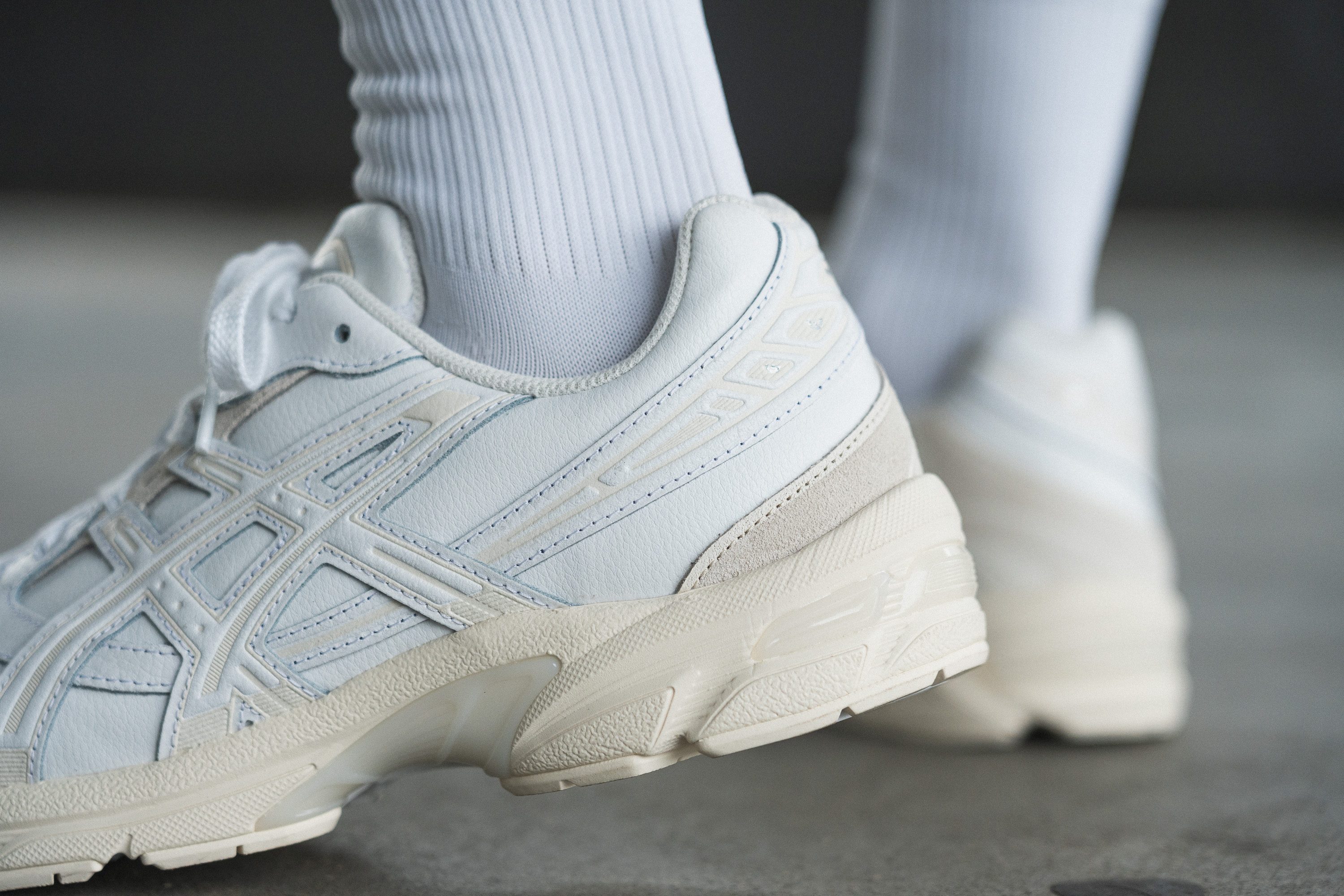
But this is not necessarily a bad thing, though! The heel proved to have the right amount of cushioning to keep us going all day long. Even though it's not one of those chunky platform trainers, that doesn't mean this ASICS is not comfortable. In fact, after our wear test, we completely agreed on it: it's incredibly comfy and supportive!
We grabbed our calliper to put a number on it and it showed a regular sneaker stack height of 32.3 mm.
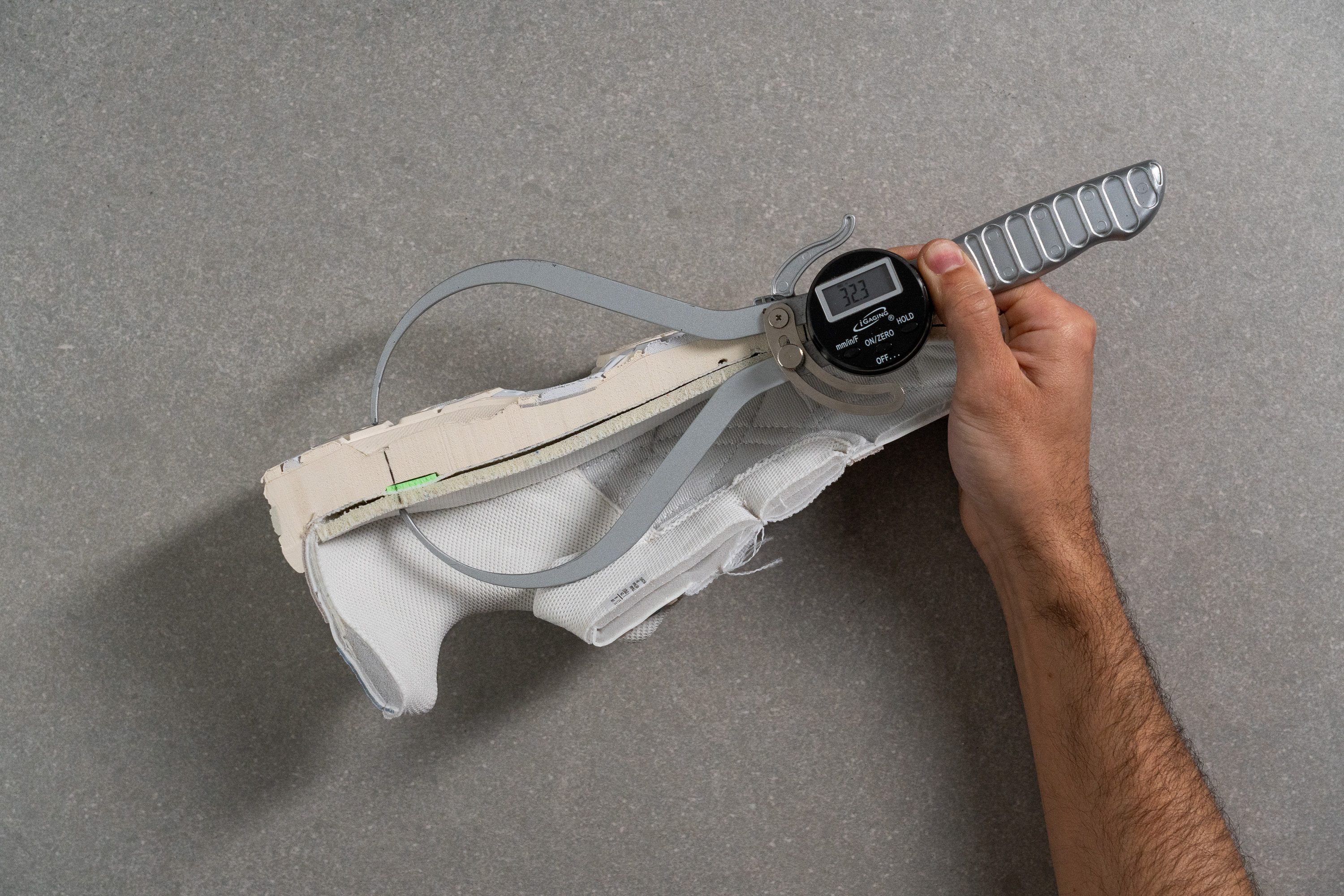
| Gel 1130 | 32.3 mm |
| Average | 30.7 mm |
Forefoot stack
With a slightly higher-than-average forefoot stack (22.3 mm), this pair keeps things cosy under the ball of foot too.
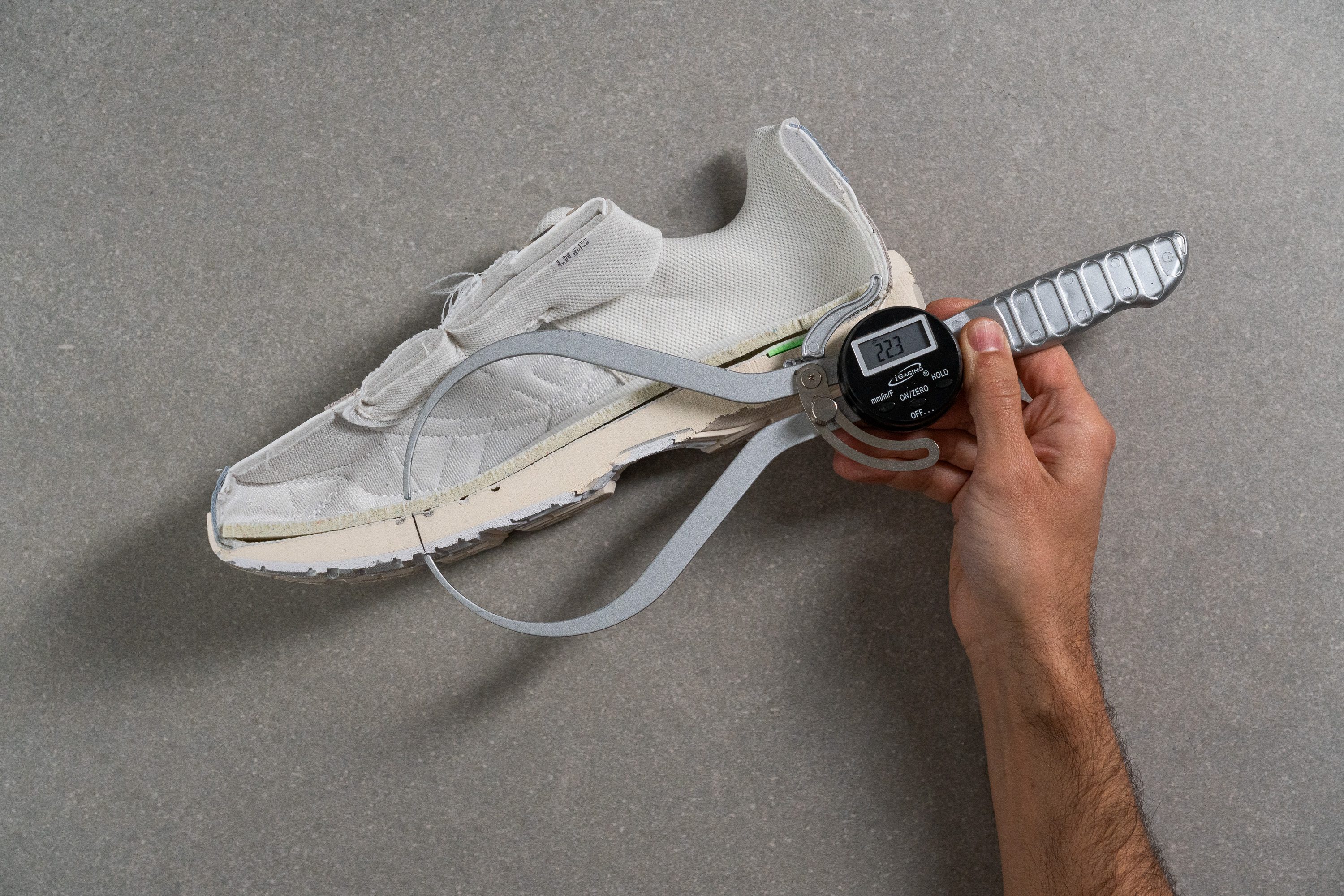
This means your feet will still be able to have more of a ground feel, but stay protected at the same time. Isn't that a wonderful combo?
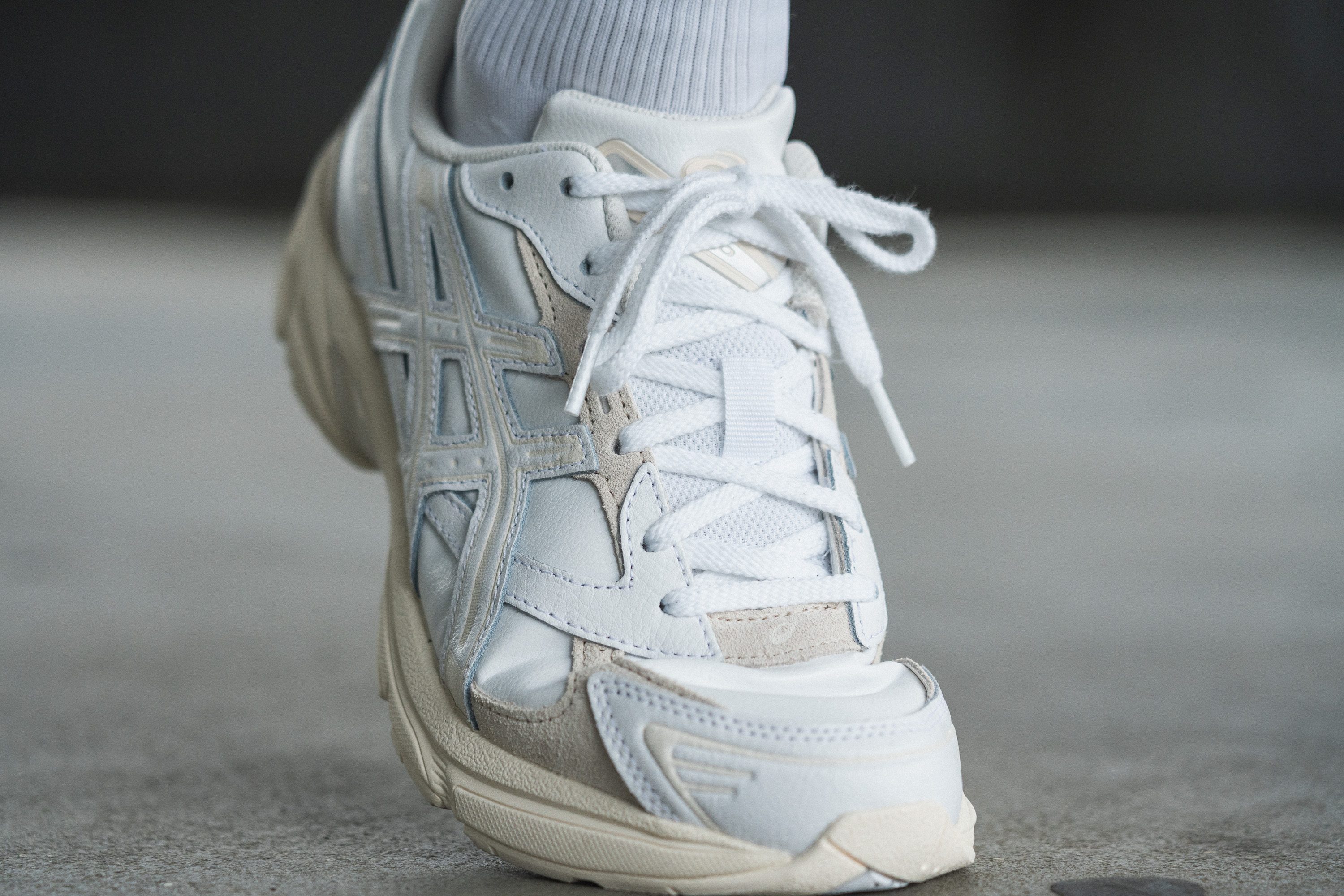
| Gel 1130 | 22.3 mm |
| Average | 19.5 mm |
Drop
This shoe doesn't have a high stack at the forefoot, and it's not that big on the heel either. That's why its drop is normal for a sneaker: 10.0 mm according to our calculations.
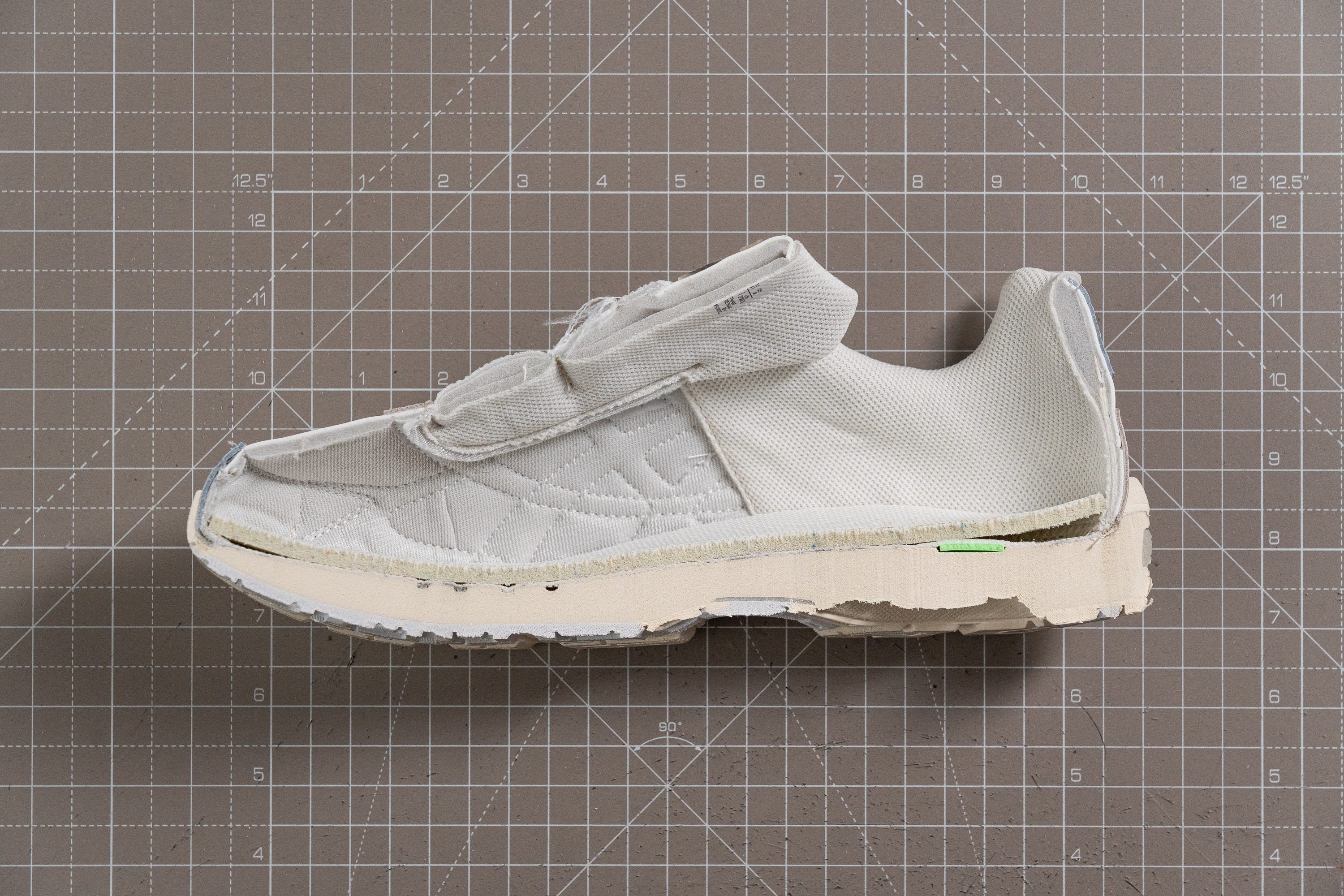
You can see it clearly in the picture above. There's not a big difference between either of those parts, which means this pair won't feel weird or different when you put it on for the first time. So, yeah, don't worry, we didn't have to get used to it or anything in our wear tests, so neither will you when you try it!
| Gel 1130 | 10.0 mm |
| Average | 11.2 mm |
Midsole softness
UpdatedThe plushness and softness of this ASICS shoe's midsole made us daydream every time we walked around town. It didn't matter if we were just hanging out with friends, doing some shopping, running errands... All we could think about was: "Oh my, so so comfy!"
At 43.9 AC, our durometer confirmed our assessment, proving that the 1130 is indeed softer than average.
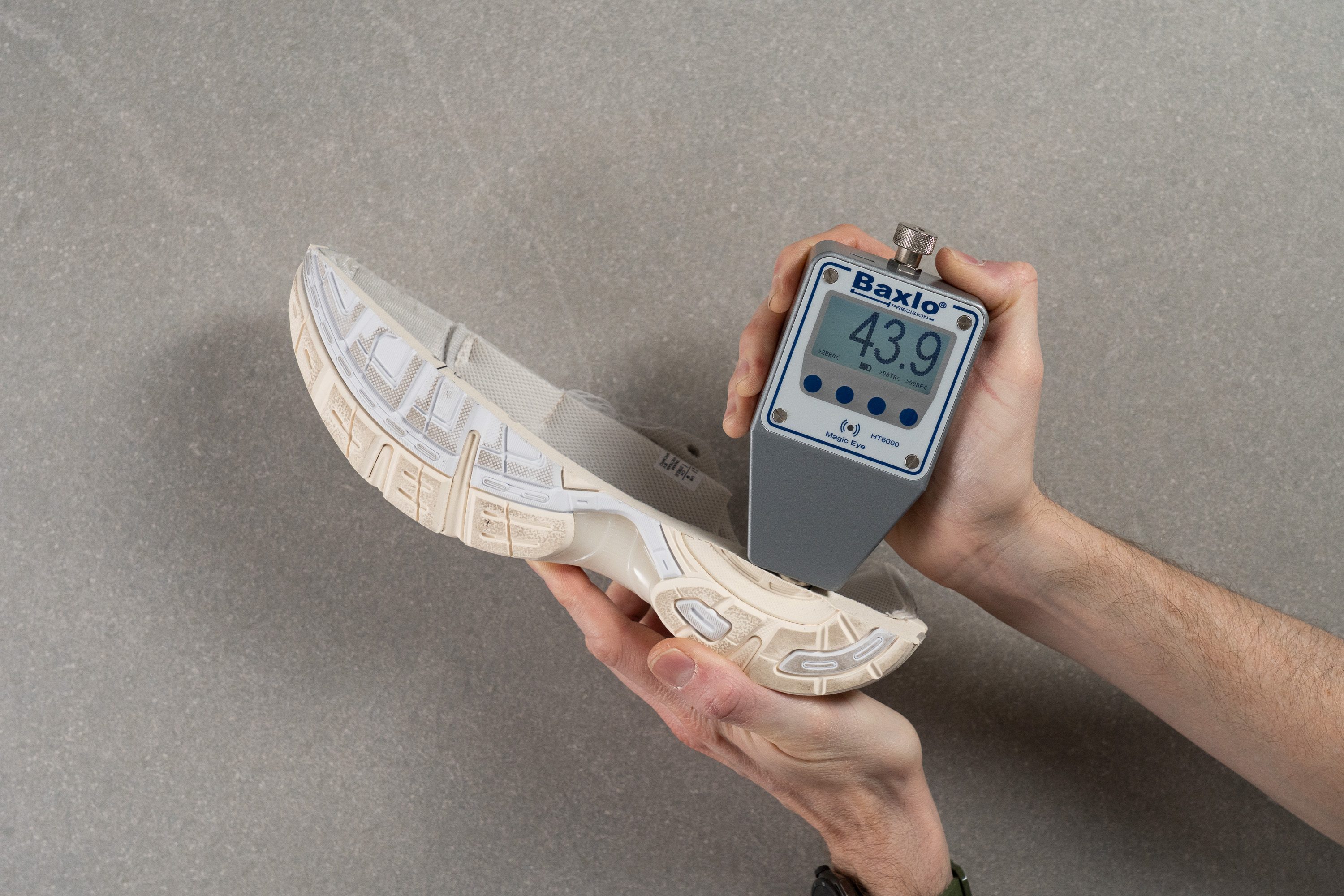
| Gel 1130 | 43.9 AC |
| Average | 47.8 AC |
Size and fit
Size
ASICS Gel 1130 fits true to size (325 votes).
Internal length
| Gel 1130 | 271.1 mm |
| Average | 272.3 mm |
Width / Fit
The ASICS Gel 1130 treated our medium-width feet to a pleasantly roomy fit.
Having created the gel mould of the kick's interiors, we measured its widest area at 94.5 mm. This is slightly above the average but not enough to call it wide. It is a medium fit with some wiggle room for long hours of walking.
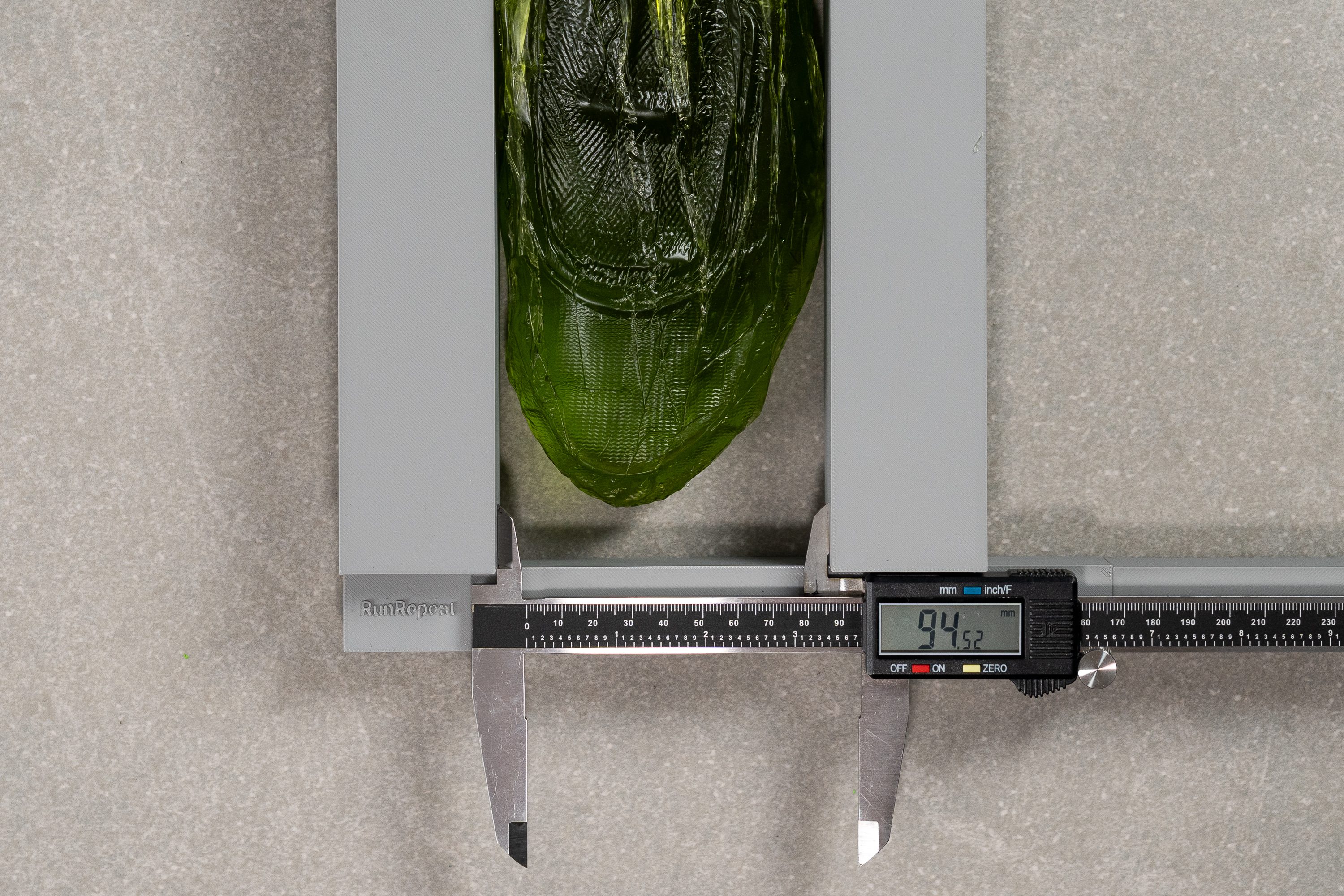
| Gel 1130 | 94.5 mm |
| Average | 92.5 mm |
Toebox width
We also found that this ASICS kick has a moderately rounded non-pointy shape of the toebox. Our calliper showed a standard width of 69.1 mm in the narrower part of the mould, near the big toe.
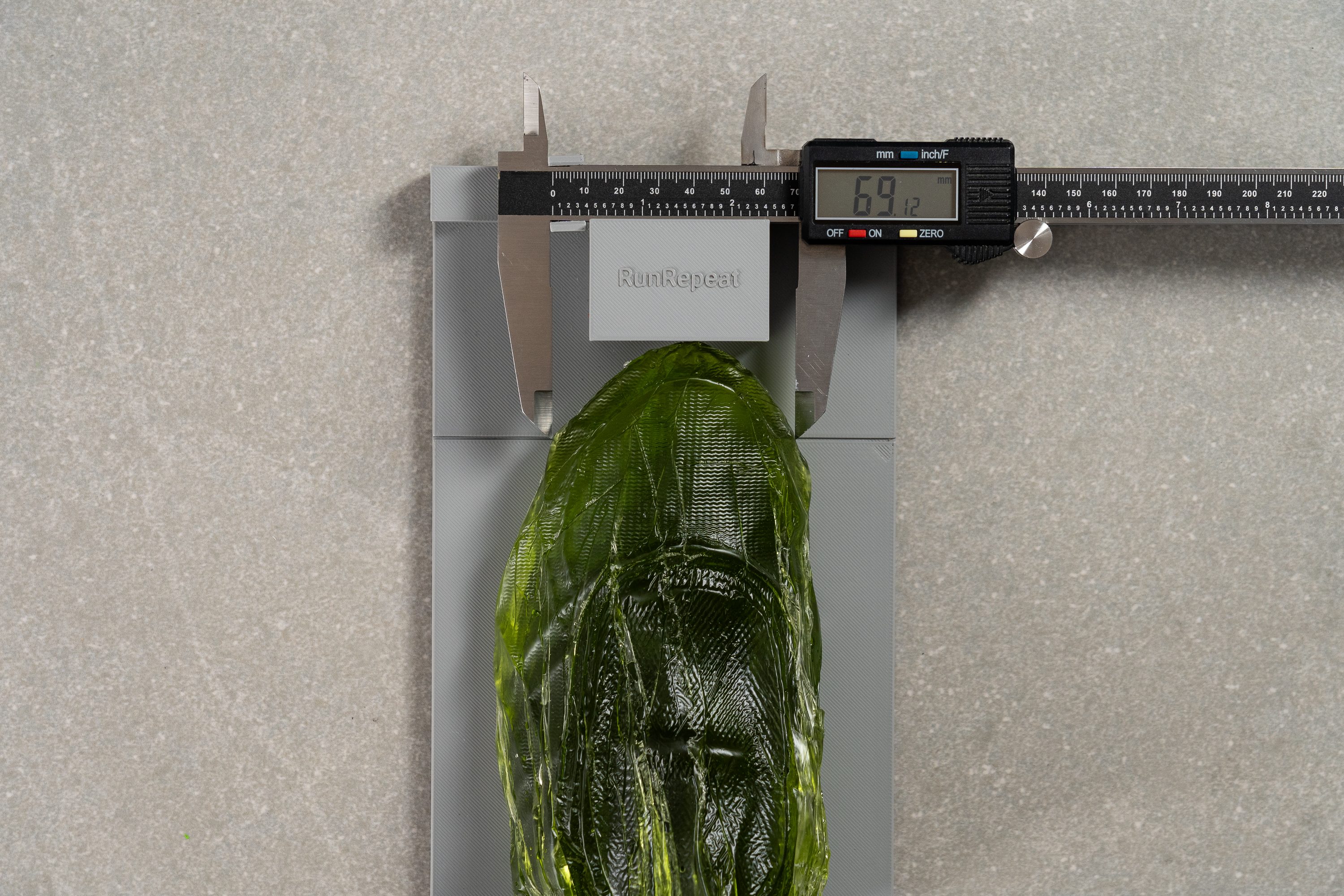
| Gel 1130 | 69.1 mm |
| Average | 68.9 mm |
Toebox height
On the downside, the top of the shoe's toebox may be sitting too close to the toes as its toebox height is much lower than average at 24.4 mm.
We didn't feel contricted by it but people with black toenails, painful toes or other concerns should be aware.
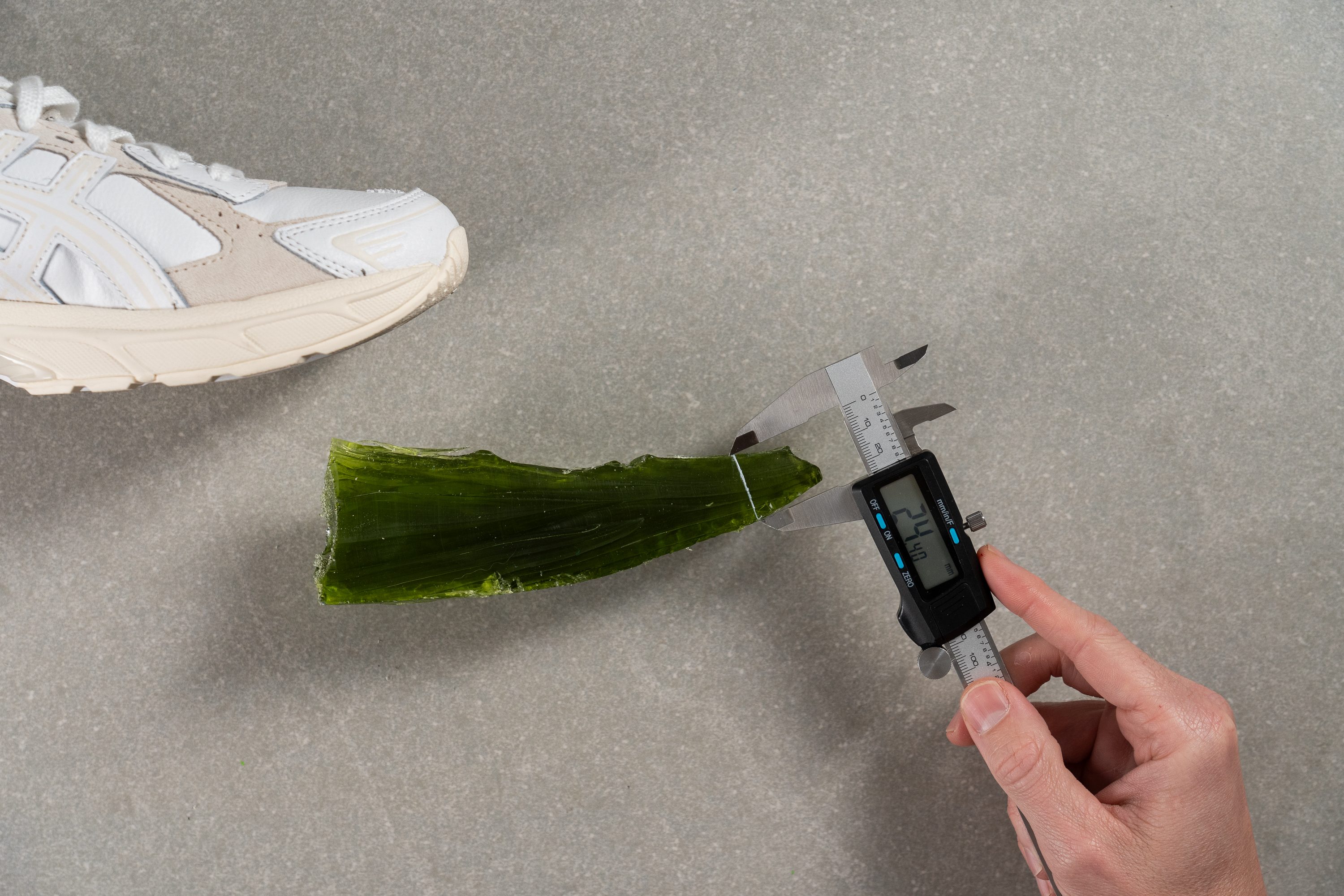
| Gel 1130 | 24.4 mm |
| Average | 27.8 mm |
Traction / Grip
As expected from a former running shoe, these baddies are grippy!
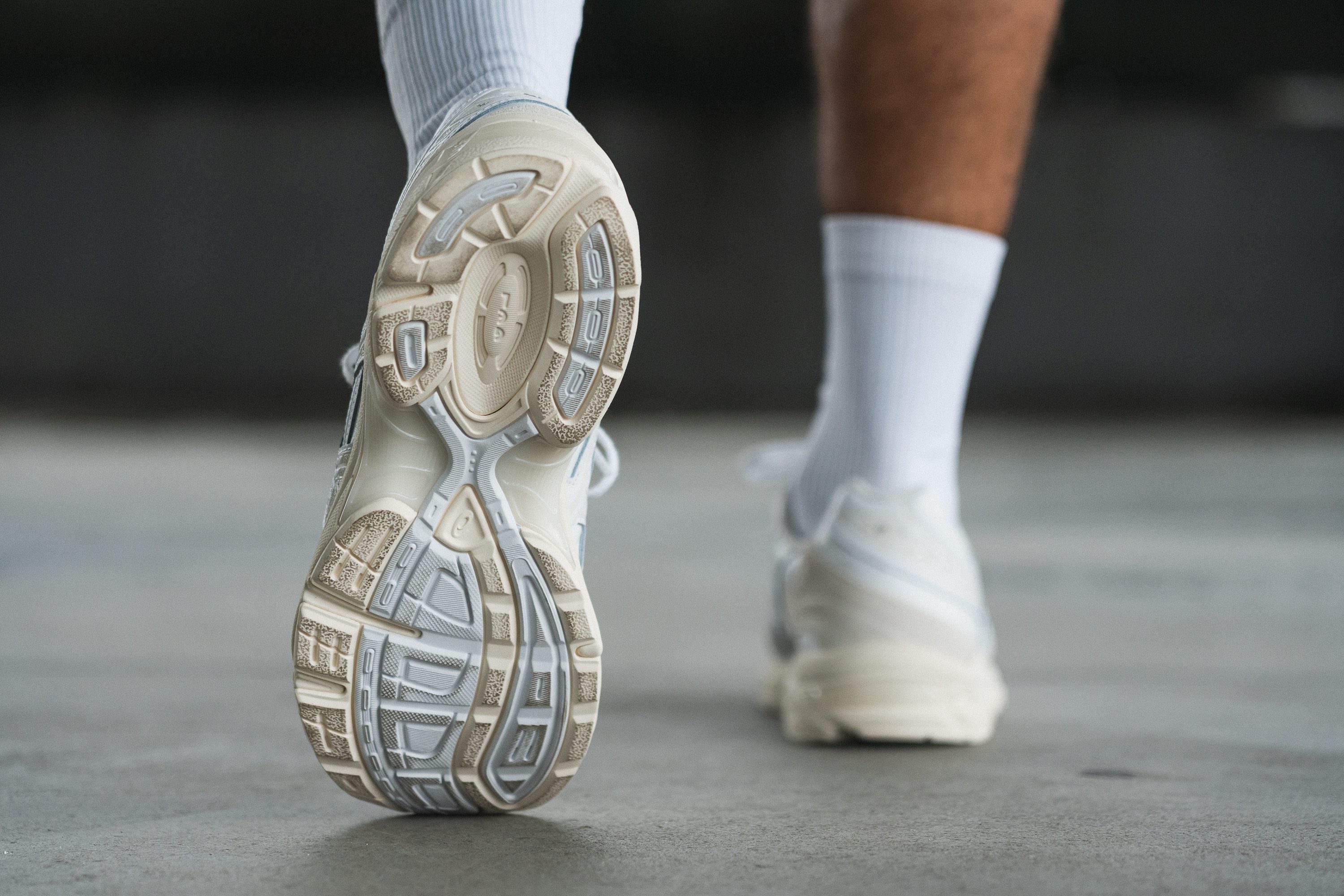
The big flex grooves added some extra flexibility to the overall rigid and supportive structure, which is something we loved. Also, to give them some extra points, they didn't catch many pebbles when we were walking around!
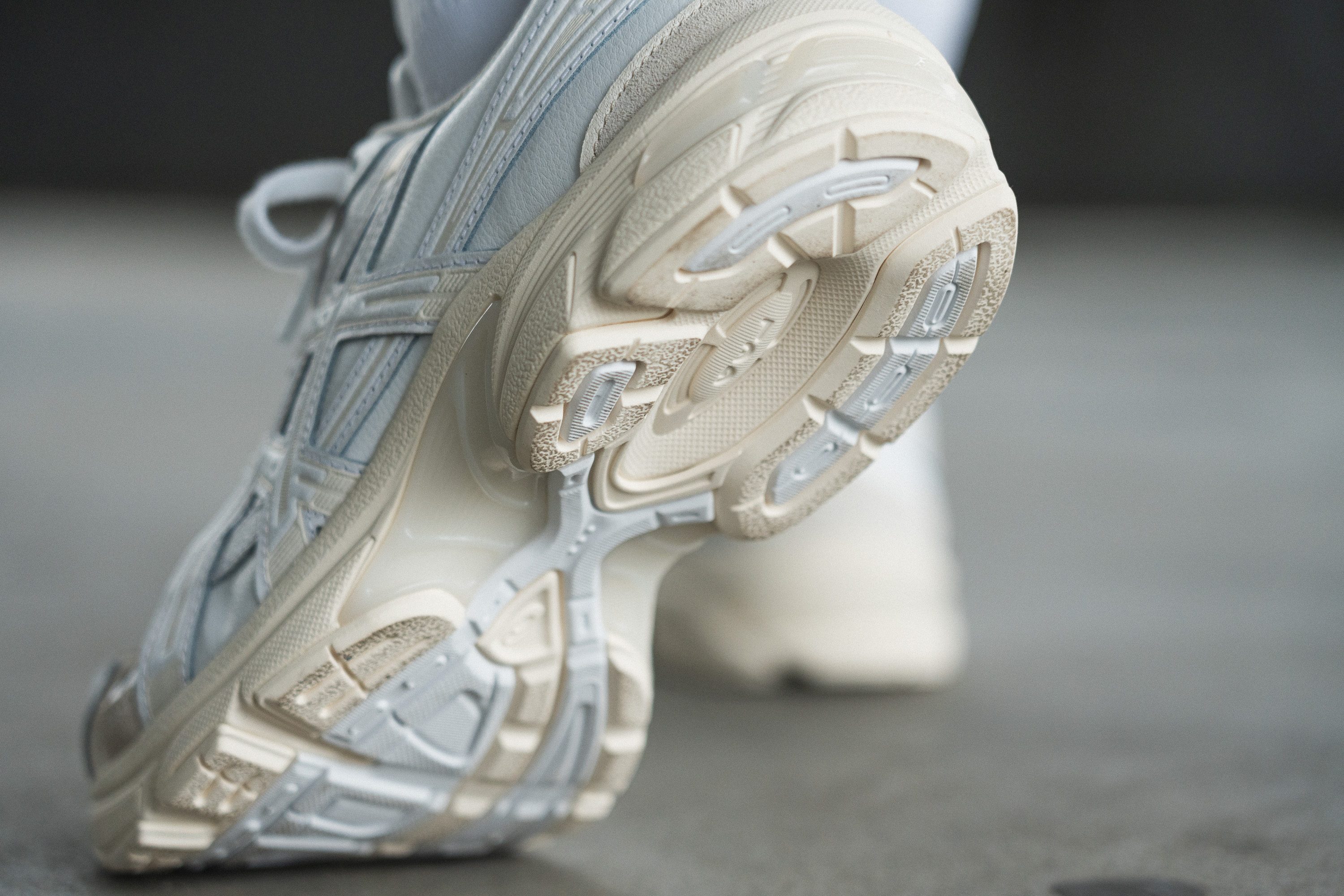
The traction of this ASICS is no joke, and we could enjoy it ALL. DAY. LONG.
In this picture, you can see clearly that the rear and the front of the foot are separated. These two parts feature the Gel technology, as the brand strategically places it where it works best. At the back, it dampens impacts; at the front, it improves cushioning.
Traction test
If you expect great outsole grip regardless of how dry or wet the city streets are, the ASICS Gel 1130 is an excellent option. Showing a high coefficient of friction in our controlled grip test (0.55), it proved to be significantly tackier than most other lifestyle kicks we've tested.
| Gel 1130 | 0.55 |
| Average | 0.43 |
Outsole design
The 1130 features a typical retro runner outsole with lots of rubber, multi-textured treading, and flex grooves. This is a tried-and-true mix that provides durability, grip, and flexibility for smooth and surefooted steps.
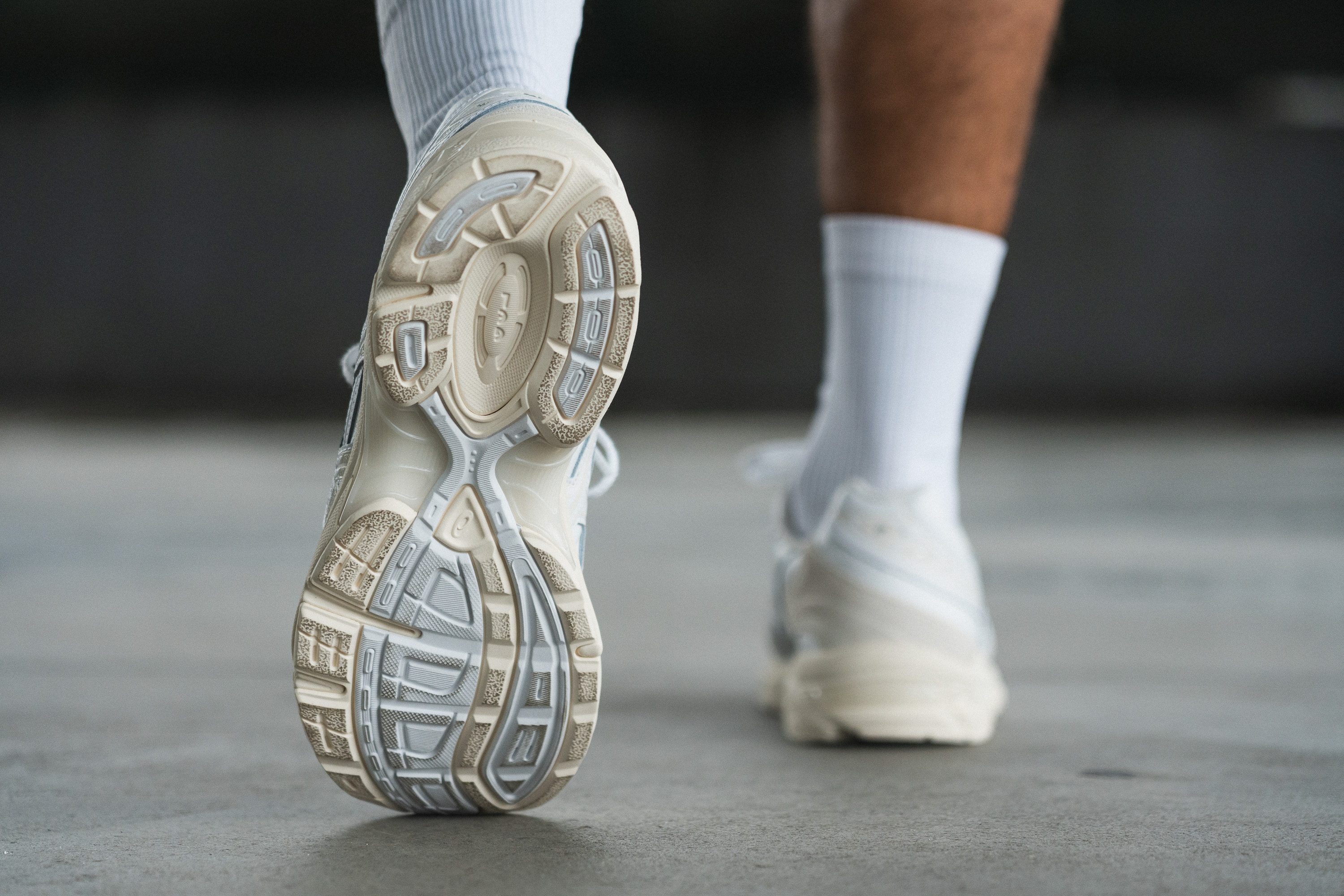
Flexibility / Stiffness
Despite its major focus on stability, the ASICS Gel 1130 turned out to be equally flexible as the other casual trainers in our lab. As our shoe flexing tester showed, this ASICS kick required a standard amount of force (14.3N) to bend by 30 degrees.
We found the shoe nice and comfortable during our walks but if you prefer a more pliable experience, try looking at the shoe's mesh and fabric variants. Because the leather upper of this version definitely contributes to the stiffness.
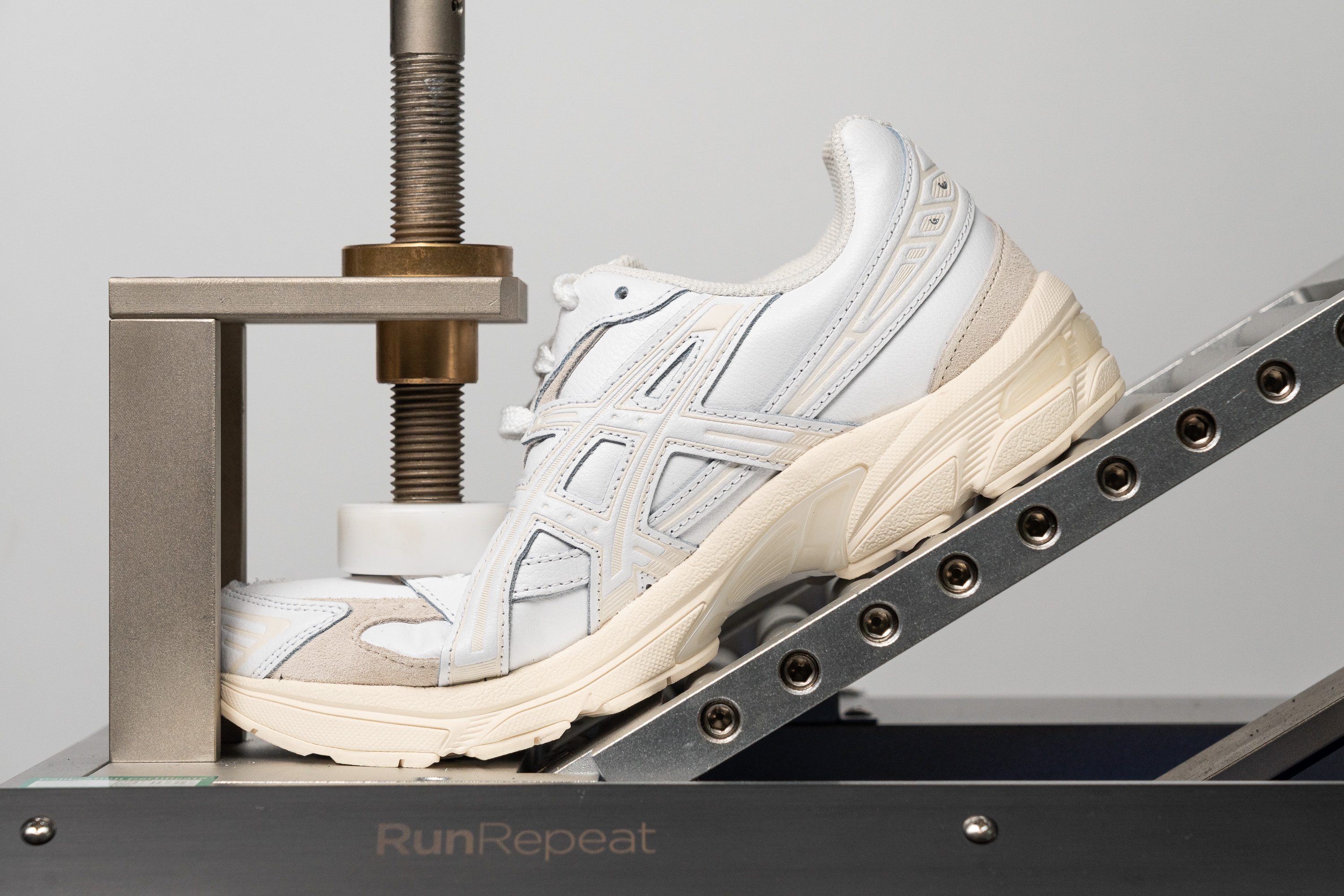
| Gel 1130 | 14.3N |
| Average | 13.3N |
Weight
Reducing the amount of material used in the outsole is bound to make the shoe lighter. At the same time, picking a hard rubber makes up for the thinner layer, not risking the pair's durability.
As many parts of this ASICS are durable, we expected it to be on the heavier side. But... what if it follows the previous formula? So, less amount of material, but harder or more resistant? Would this make the shoe uncomfortable?
Wait, wait, let's not beat around the bush. We're here to talk about the Gel 1130's weight!
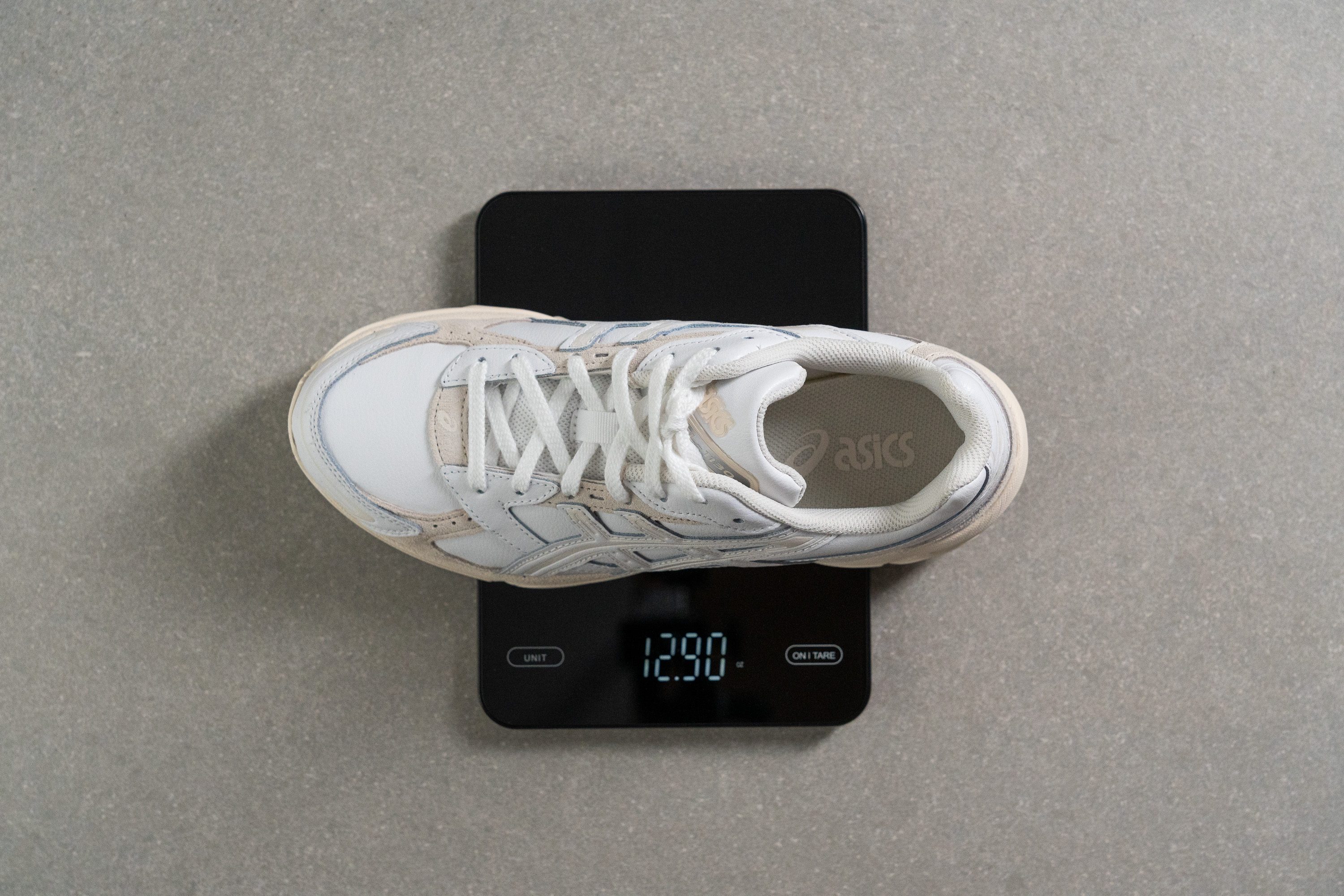
At 12.9 oz (366.0 g), our scale told us clearly that this model is fairly lighter than average! So, we were wrong about the "durable means heavy" hypothesis, but... not so much about the "less amount of materials but more resistant ones"!
We're more than happy to announce that this model is 9% lighter than average!
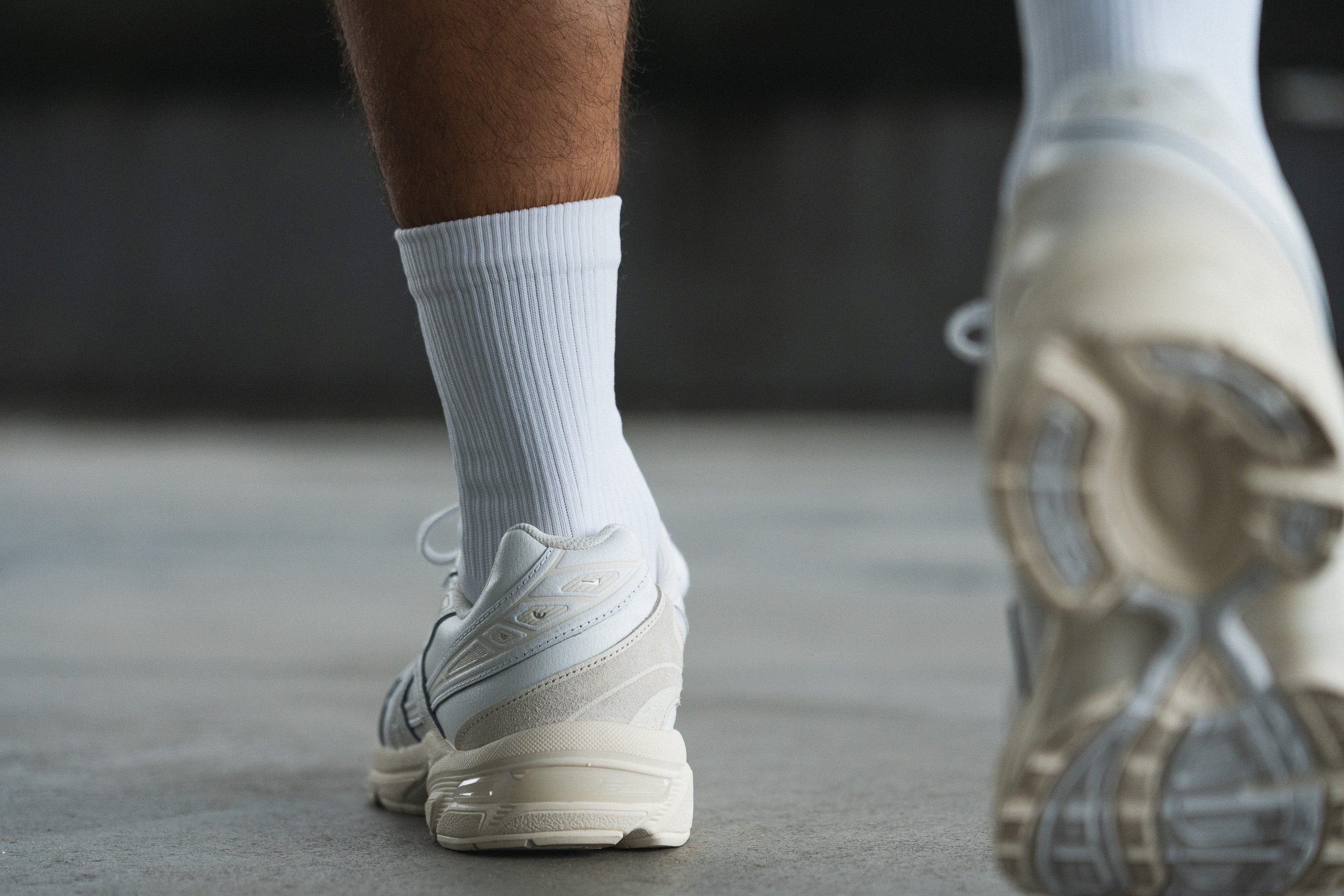
We definitely felt it in our feet when we were walking around town. Even though we couldn't feel the breeze in our feet, this ASICS treated us to a breezy ride! We could enjoy it for hours as long as it was not too hot.
The A in the ASICS Gel 1130 stands for: "A new walking partner".
| Gel 1130 | 12.9 oz (366g) |
| Average | 13.8 oz (390g) |
Breathability
Disclaimer: Please, note that we are testing the leather version of the shoe.
The name ASICS was created as an acronym from a very famous Latin phrase that goes: "Anima Sana In Corpore Sano". This basically means a healthy mind in a healthy body, but... what about healthy feet?
Well, the Gel 1130 is a good example if we're talking about healthy feet... during winter. Wanna see why?
Because they won't be able to breathe in the summer! The comparison with the PUMA RS-X (on the right) is almost cruel. It earned a 4/5 in our breathability test, as you can see all the smoke coming out of it in the video. The Gel 1130? A 2/5, and just because of its tongue area. We can't see a lot of fume, but it's a steady flow, so we just couldn't give it our lowest grade.
When we put the shoe in front of our bright light, it didn't even let a single bit of it come through! This means this ASICS doesn't have any ventilation holes or gaps. Should we have a closer look at the material and see what's up?
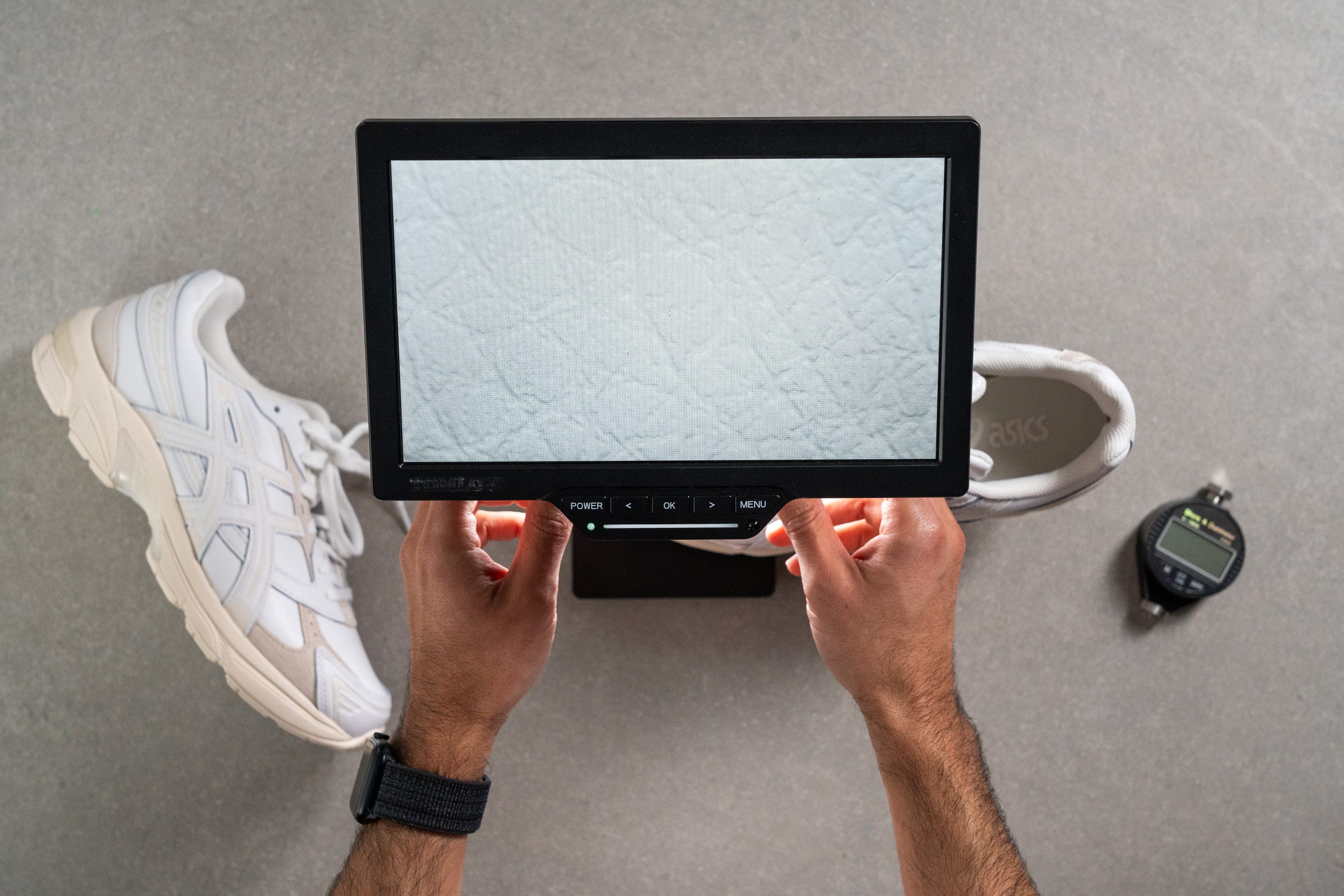
It's leather, and leather trainers usually don't perform very well in this test.
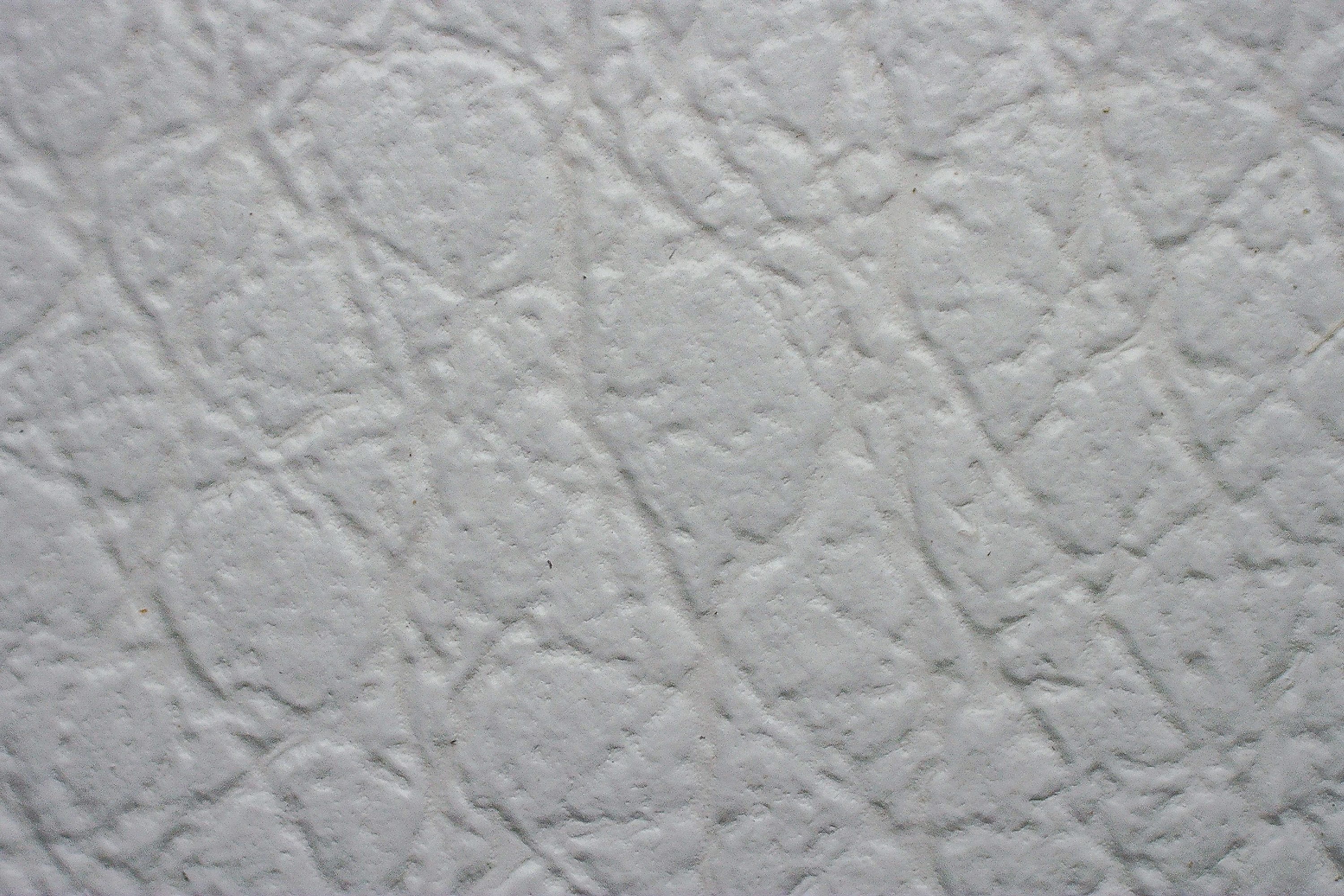
See, the only moment where we'll possibly get a gap in this material is when we break it. And that's definitely a no-no.
If you're looking for a breathable pair designed using leather and you're a big fan of ASICS, we think you should have a look at the ASICS Gel Lyte III.
The C in the ASICS Gel 1130 stands for: "Can't be used in the summer!".
| Gel 1130 | 2 |
| Average | 3 |
Stability
Lateral stability test
Stability? Oh, please. For such resistant and supportive shoes, being stable is a piece of cake!
Just by watching the video you'll most likely know, but we'll say it anyway: the Gel 1130 used to be a running stability shoe! This means its whole design focuses on you not losing your balance.

After our lab tests, we found out that it keeps and features the TRUSSTIC™ support system. This technology helped runners of the late 2000s improve their stability.
The S in the ASICS Gel 1130 stands for: "Stability".
Torsional rigidity
Listen, if a shoe focuses on stability, then... it's gonna be rigid.
We twisted, bent, and squeezed the Gel 1130, and our hands actually had a hard time doing so. Check this out!
Our fingers were struggling there, no kidding... So we gave it a well-deserved 4 out of 5 in our torsional rigidity test.
But before we go on, let us clarify something. When we say something is rigid, we usually think about it as uncomfortable, right? Like, the opposite of soft and plushy. Yet, that's not necessarily the case! Even though this shoe is rigid, our feet felt extremely happy when we put it on. This is just one more reason why we believe it's crucial to perform multiple lab tests, as well as wearability tests, on every shoe.
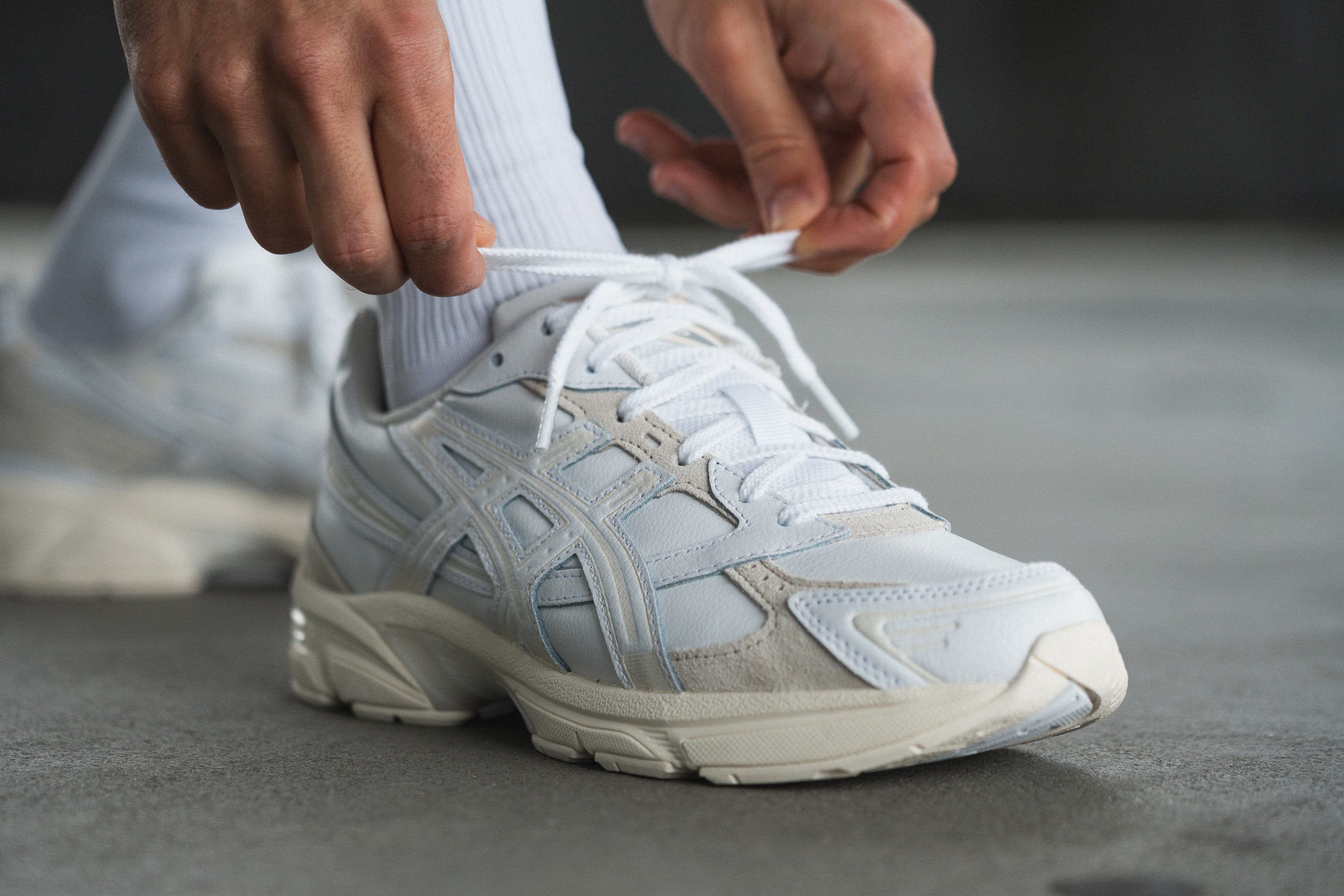
| Gel 1130 | 4 |
| Average | 3.6 |
Heel counter stiffness
Once again, the heel is the main character of our Breaking Point play.
We've said this shoe is stable and rigid, right? And the heel padding put up a good fight (and even won) against our Dremel, right? And stiff shoes are usually harsh on our feet, right?
This time, the S in ASICS stood for: "SCARED". Cause that's what we were.
But then, when we grabbed the shoe, we could feel a sigh of relief leaving our body. During our manual test, the heel counter did give in more than we expected. Honestly, we thought it would score another 4 or even 5 out of 5. But happily, we were wrong!
It's slightly pliable, so it earned a marvellous 3/5. This means no blisters, no uncomfortable rubbing, and no pain walking!
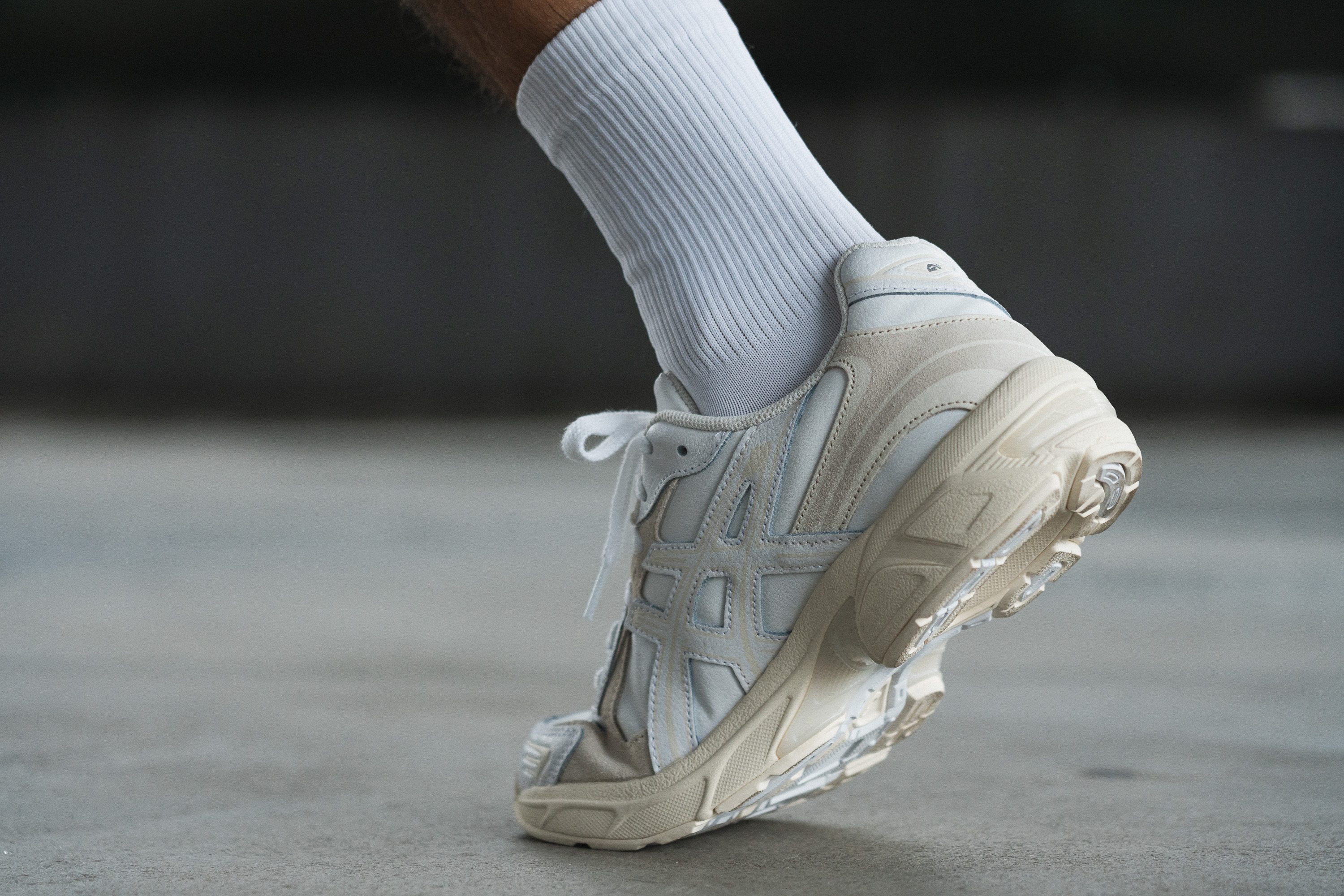
This actually goes hand in hand (and heel in heel) with what our feet felt during our tests walking around.
Thank you, ASICS!
| Gel 1130 | 3 |
| Average | 3.2 |
Midsole width - forefoot
Good news here, too!
At 111.8 mm, our calliper told us the midsole width in the forefoot of the Gel 1130 is wider than average by just 3%. This might not sound like much, but wider platforms mean more stable shoes. Which means comfy feet. Which means happy you and happy us!
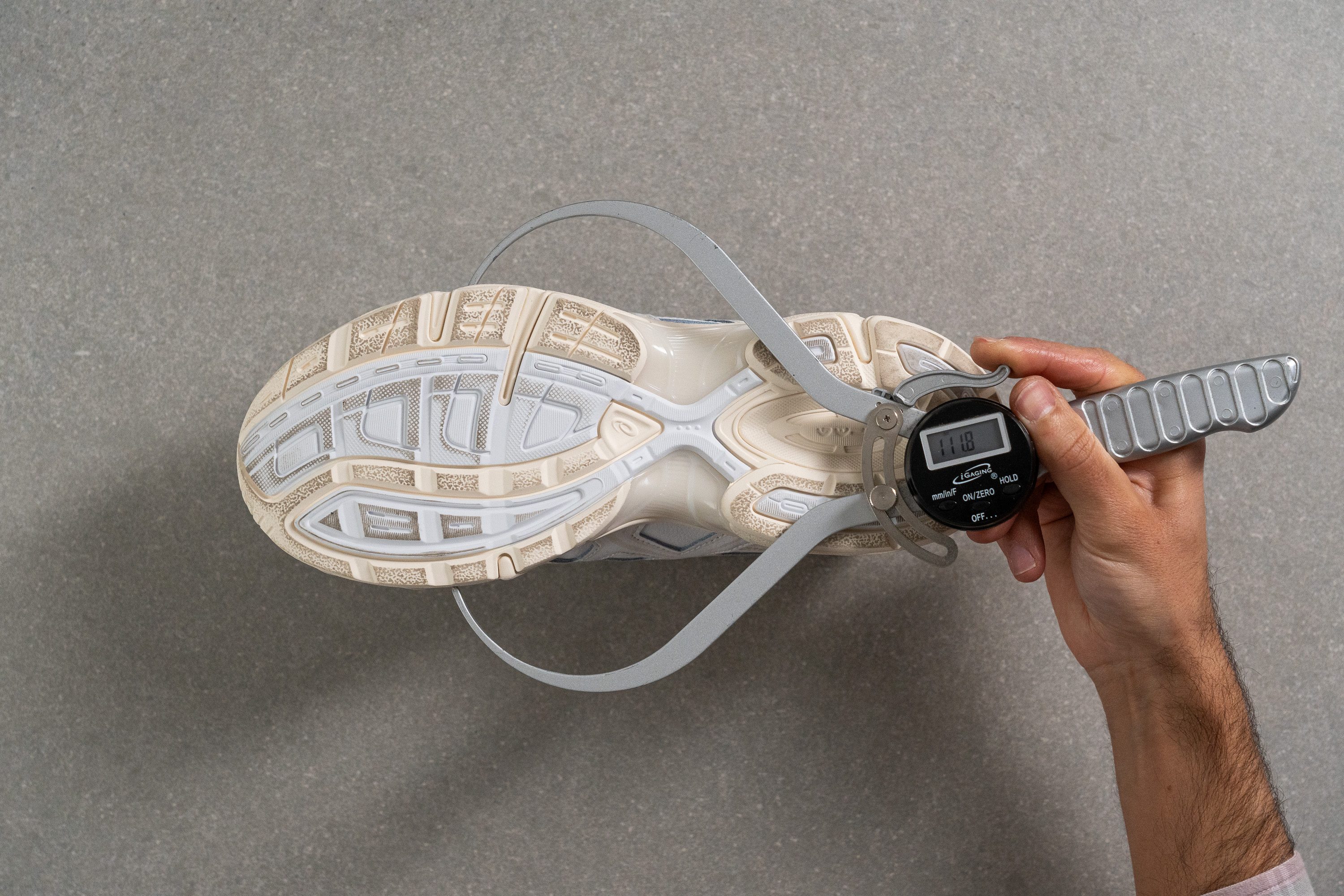
| Gel 1130 | 111.8 mm |
| Average | 108.9 mm |
Midsole width - heel
It gets even better in the heel!
At 90.1 mm, this shoe's midsole is 8% wider in the heel than average. The stiff sidewalls and the accommodating heel just added up some more points to the stability category, levelling up with the wider-than-average midsole.
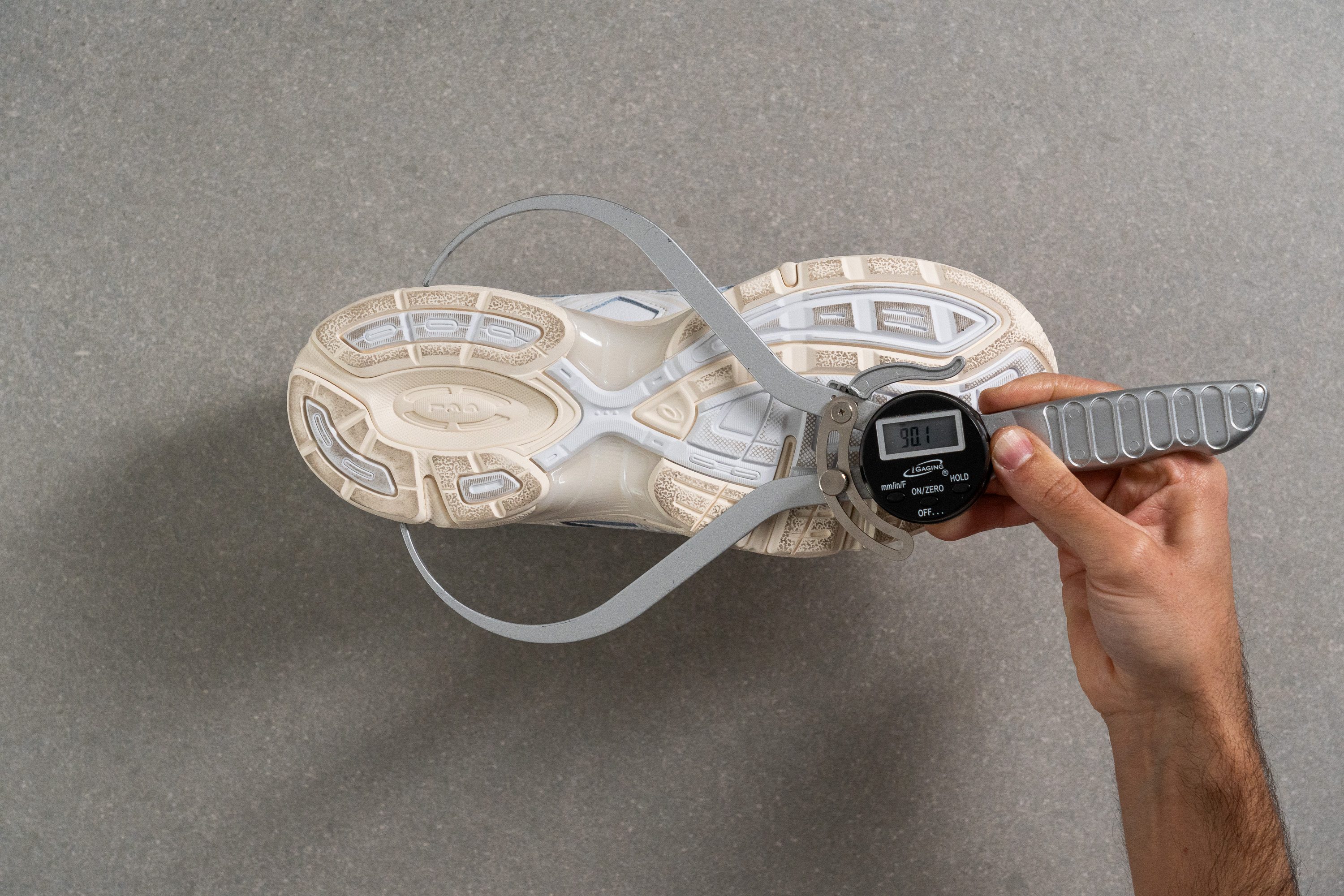
| Gel 1130 | 90.1 mm |
| Average | 84.0 mm |
Durability
Leather/Suede quality
There are some materials that are naturally more resistant to our flames. Well, Gel 1130... it's time to get hot! (And no, we don't mean you making our feet toasty).
To determine the authenticity of the suede and leather material used on its upper, we grabbed our torch and got ready for action.
We started with the tongue, and wow! Burn baby, burn. Its materials are fake/synthetic.
Test: Failed!
Now the middle part and the logo. We removed the burnt part with our awl, and the leather was fairly intact.
Test: Passed!
And last but not least, the back. Just like in the previous section, the material put up a fight. Both these parts are authentic.
Test: Passed!
The A in the ASICS Gel 1130 stands for: "A real one".
| Gel 1130 | Real leather |
Toebox durability
Low breathability usually means high durability. Come on, ASICS Gel 1130, don't disappoint us!
We took our Dremel and started battling the toebox. After the longest 12 seconds of its life, the damage was not as dramatic as it seems in the video. Look!
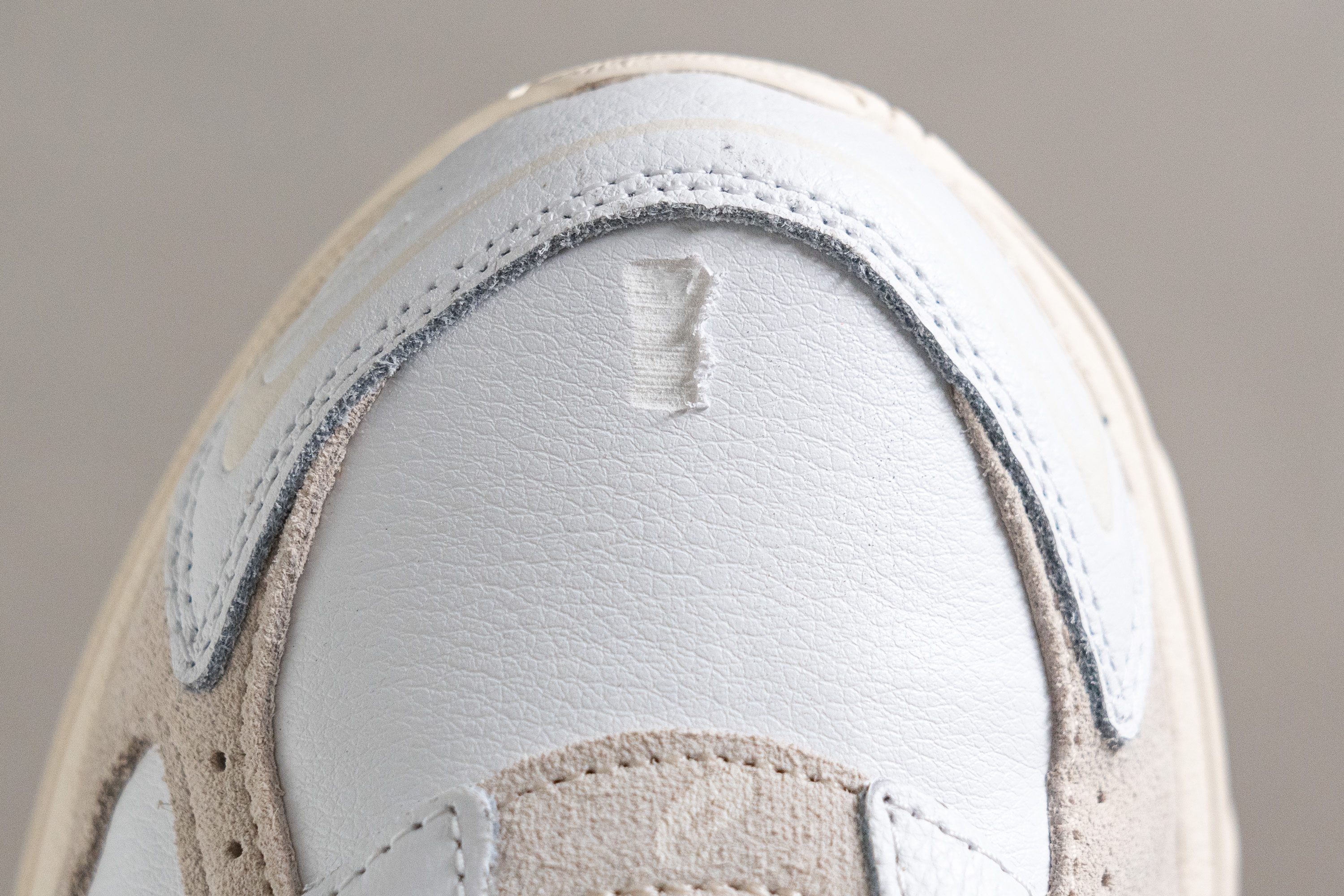
Like, of course you can see it. But... does it actually alter the shoe's integrity or performance? We're more than happy to say it doesn't! With a 4 out of 5, the toebox has won this battle.
Yet... it's too early to say the Gel 1130 has won the war! Our Dremel is still up for some more fights. Stay tuned!
| Gel 1130 | 4 |
| Average | 3.7 |
Heel padding durability
We're not gonna lie, we were scared here. You see, the heel is one of the most delicate parts of a shoe, and... you know what they say: "A masterly retreat is in itself a victory".
Yet, none of its running shoe past was useful to run away from its responsibility. Gel 1130, you need to face our Dremel again!
Given its upper's great result regarding durability, we were expecting a good score here. And we weren't wrong!
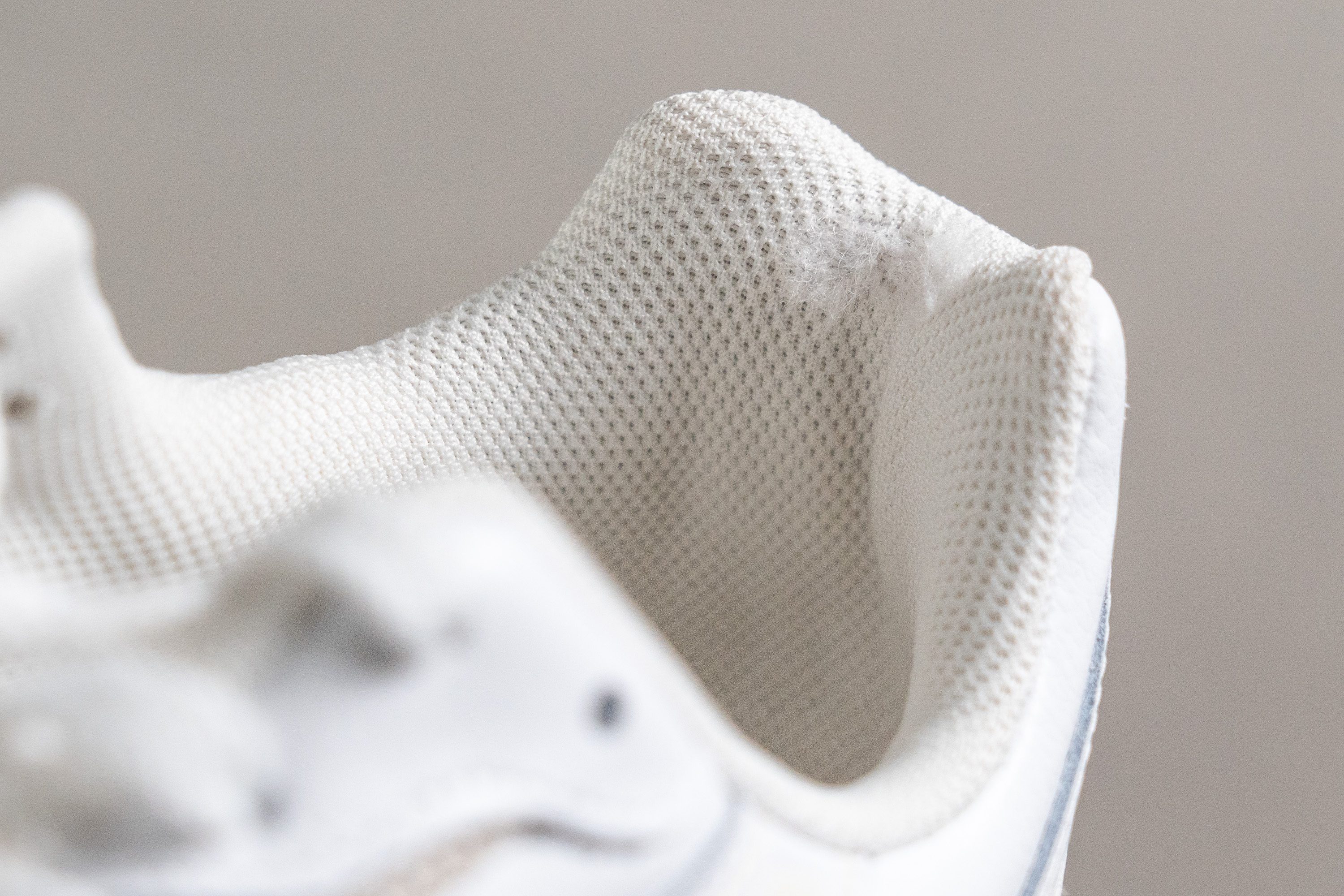
You can barely see the damage in the shoe, hooray! Such resistance has earned this ASICS an outstanding 4/5 in heel padding durability.
It's still going strong, and we LOVE it.
The S in the ASICS Gel 1130 stands for: "Standing strong!".
| Gel 1130 | 4 |
| Average | 3.2 |
Outsole hardness
When we want to check the outsole hardness of a shoe, we grab our durometer and press it against the pair's bottom. At 84.9 HC, this ASICS got a pretty average score.
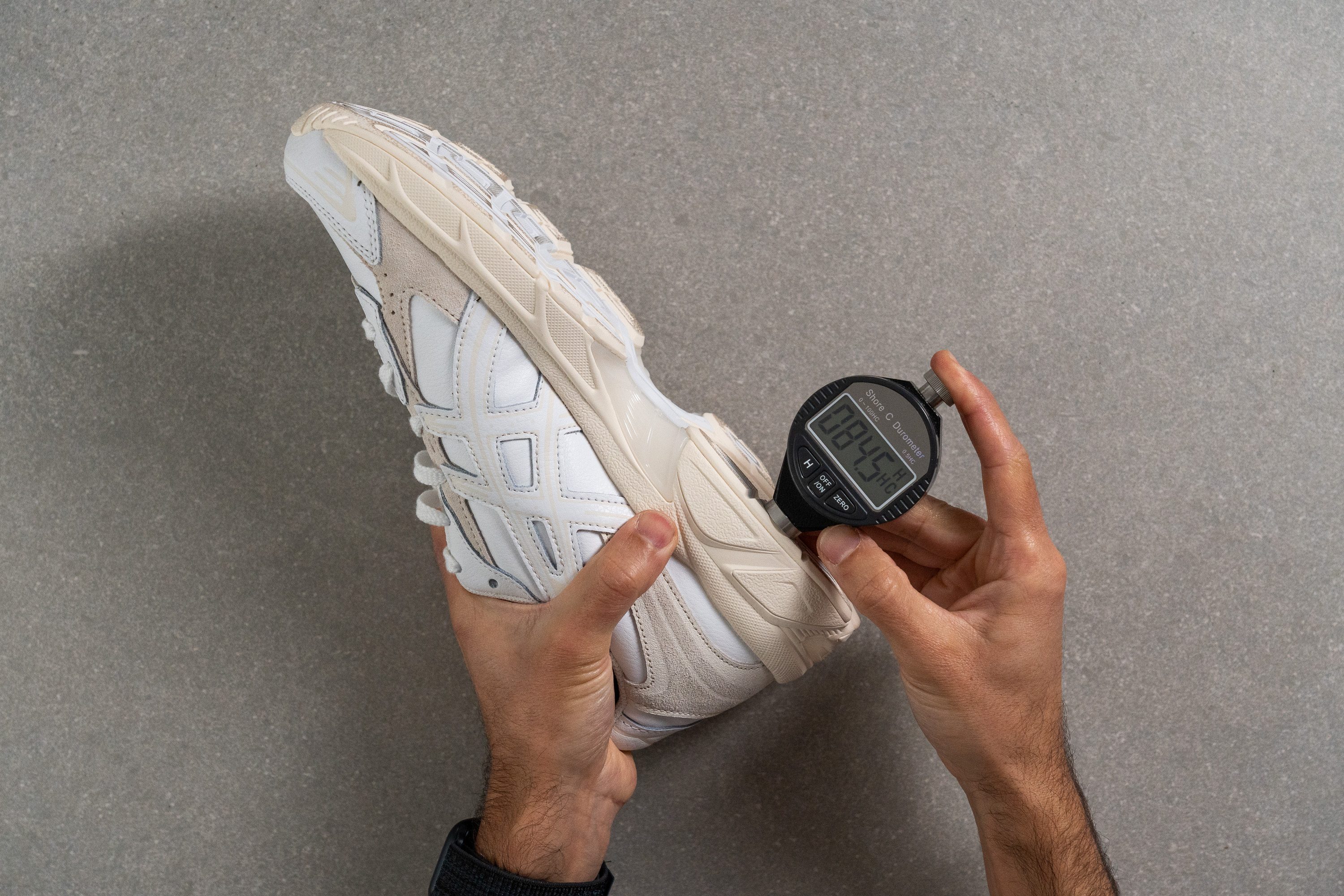
Whenever we get a result pretty close to the average, we can't help but smile. Why? Because this means that the outsole offers a great mix of durability and grip!
| Gel 1130 | 84.9 HC |
| Average | 85.7 HC |
Outsole durability
Here we go again. Dremel time!
Don't worry, Gel 1130, this is your last fight. You've won every battle so far, so... who's saying you can't win the war?
The 22 seconds of suffering were completely worth it, as this shoe's outsole is as durable as everything else.
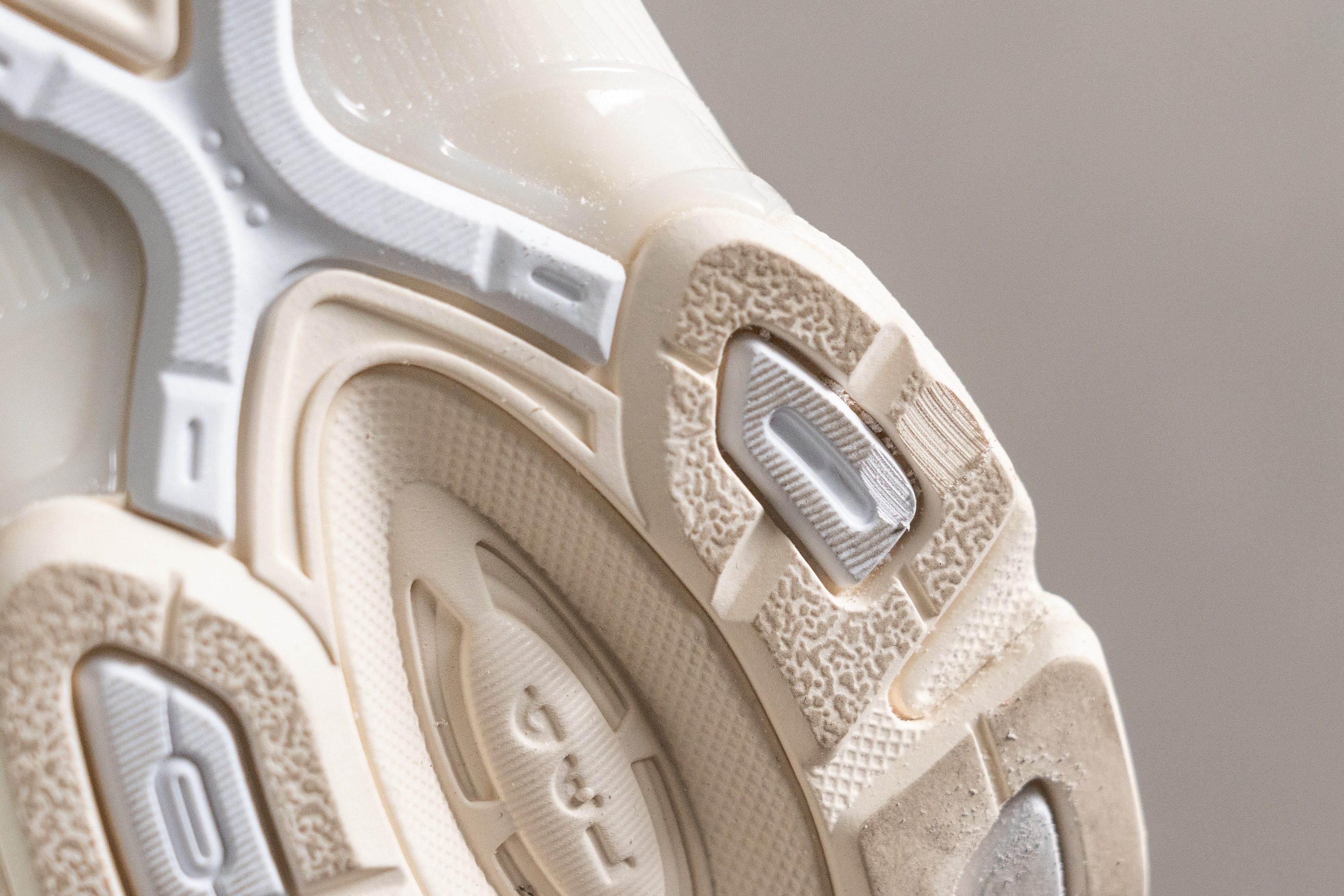
It looks like the damage is playing hide and seek, right? At 0.9 mm, our tread gauge told us this pair is just as durable as the average of our lab-tested trainers, which is great news!
Alright, ASICS, you're the queen of the durability kingdom once again! But... what other territories have you conquered? Let's find out!
The C in the ASICS Gel 1130 stands for: "Can't touch this".
| Gel 1130 | 0.9 mm |
| Average | 1.1 mm |
Outsole thickness
Oh, oh boy. Right, at 4.7 mm, our calliper would say "thinner than average" if it could talk about this shoe's outsole.
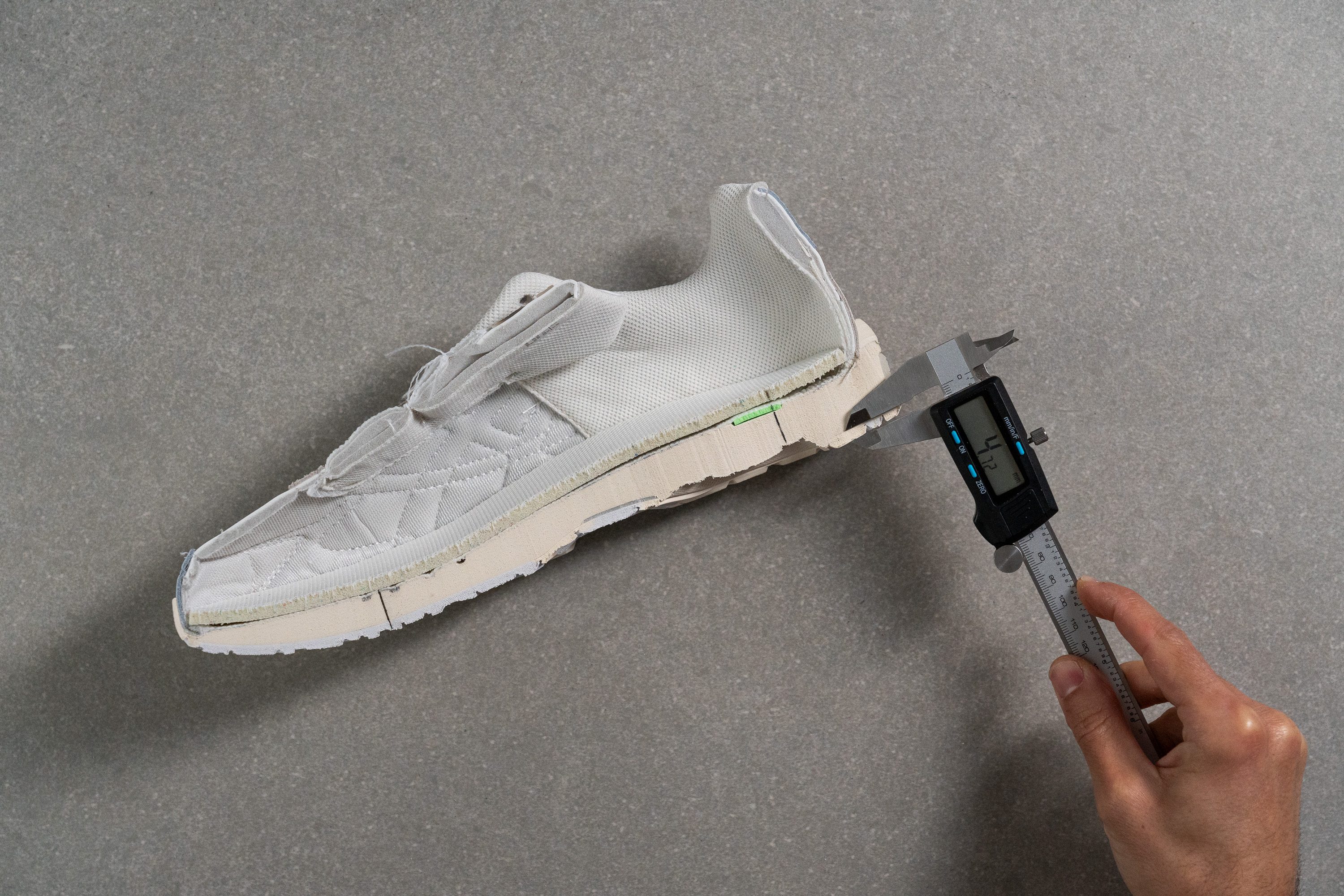
This could be worrying, as less material to wear out usually means a shorter lifespan for shoes. Nevertheless, this pair's outsole is hard and durable, which means it'll last a long time.
Question time: Is this a very intelligent design choice to reduce the overall weight of the shoe?
Think about your answer before you read the next section!
| Gel 1130 | 4.7 mm |
| Average | 5.3 mm |
Misc
Insole thickness
The removable insole of this pair didn't make us feel anything different. This was neither good nor bad, it just means that it was comfortable and that it did what it had to do.
At 5.3 mm, it's as thick as the average. Honestly, we did expect something like this, so no surprises here!
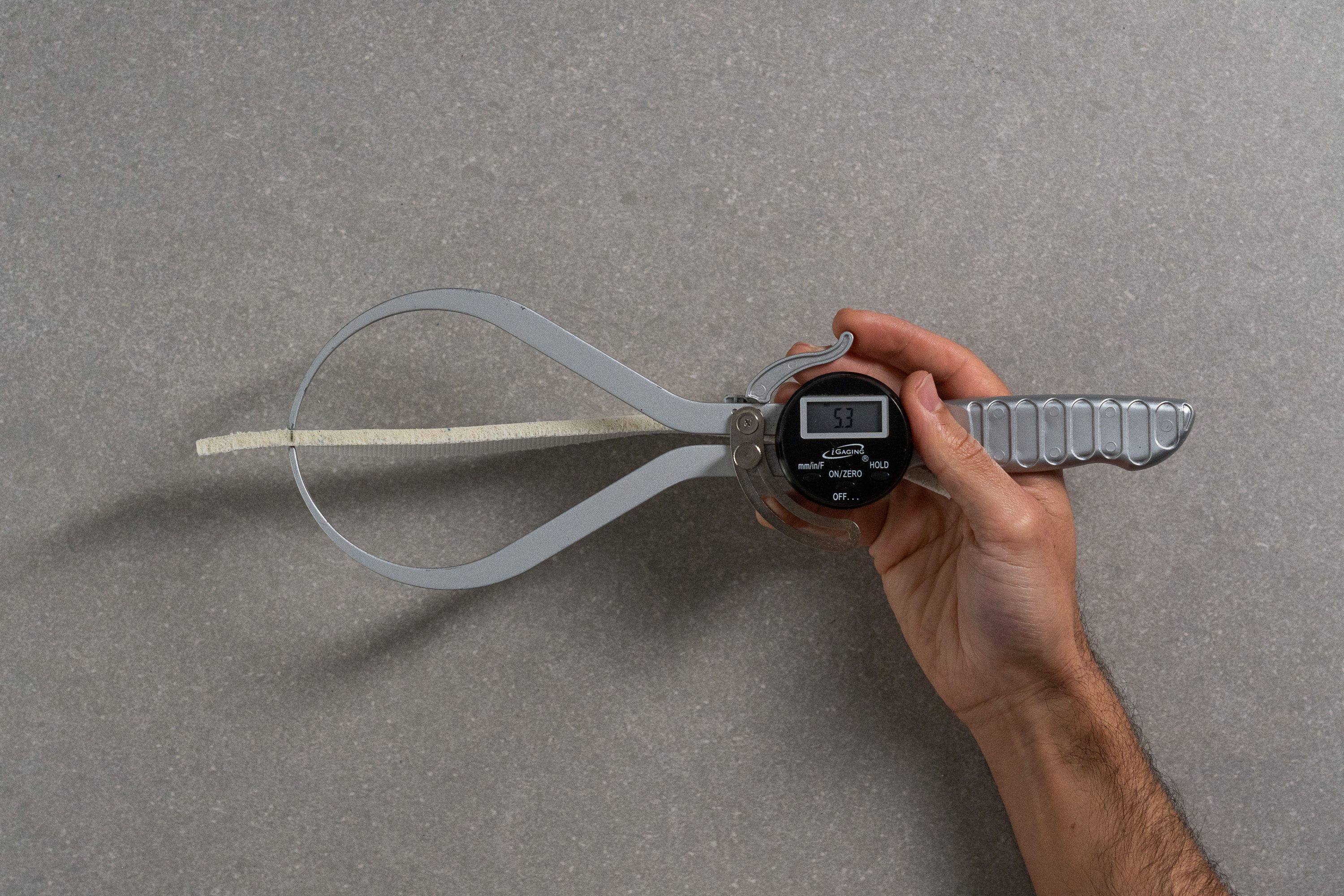
As a curious fact that we believe you should know, according to the official website, the sockliner of this shoe is produced with the solution dyeing process. It reduces water usage by approximately 33% and carbon emissions by approximately 45% compared to conventional dyeing technology.
We love it when brands get invested in becoming more green!! It's great news not only for you and for us, but for our planet too.
| Gel 1130 | 5.3 mm |
| Average | 5.1 mm |
Removable insole
This ASICS sneaker has a removable insole that was easy to get out thanks to the roomy and wide design of the shoe.
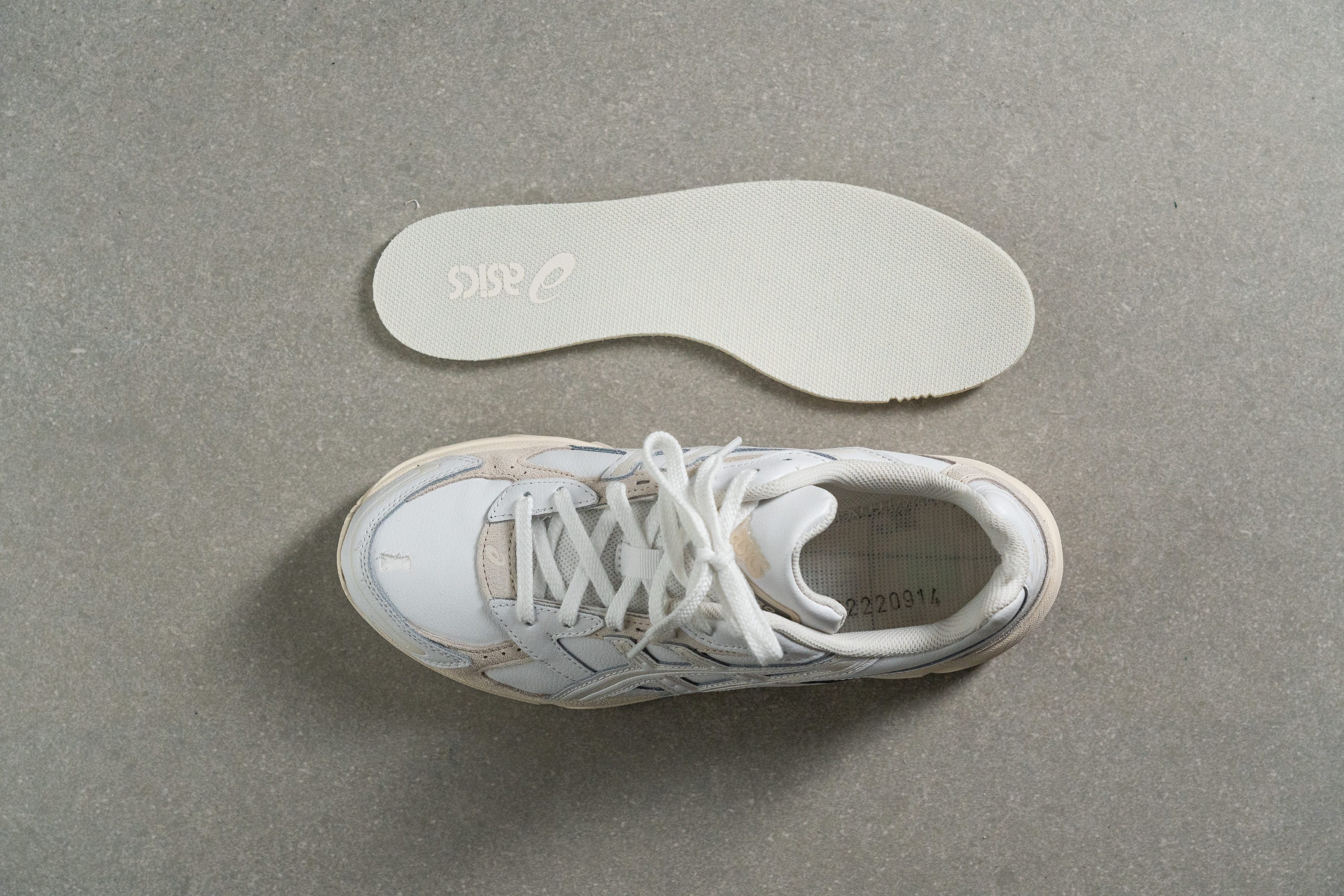
If needed, you can change it for your own orthotics. Extra points for ASICS!
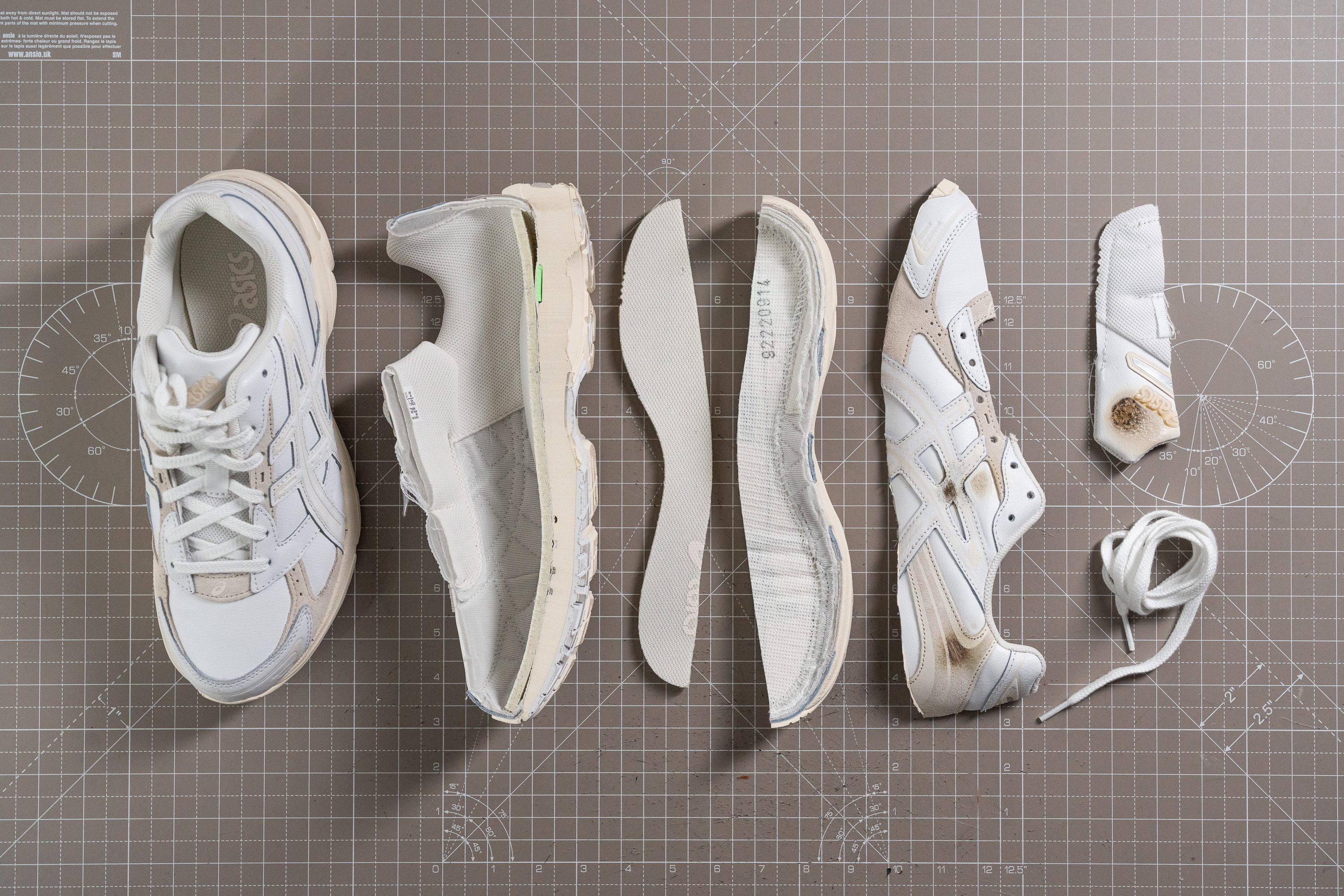
| Gel 1130 | Yes |
Reflective elements
These kicks don't have reflective elements, so make sure you don't walk around lonely and dark alleys at night!
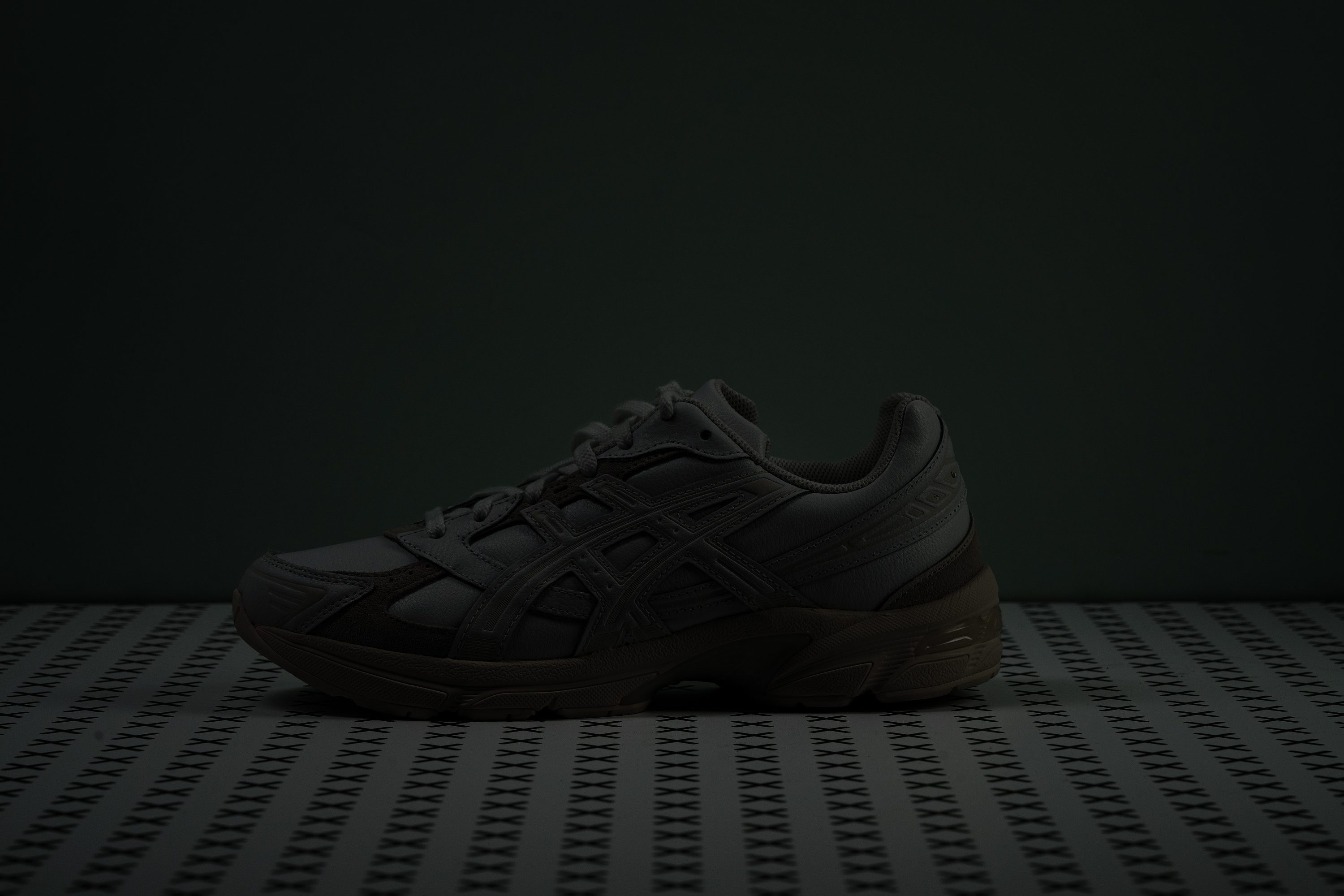
| Gel 1130 | No |
Tongue padding
There are many brands that go for a thinner tongue in order to reduce the overall weight of the shoe, so we were in awe when we measured this ASICS' tongue padding!
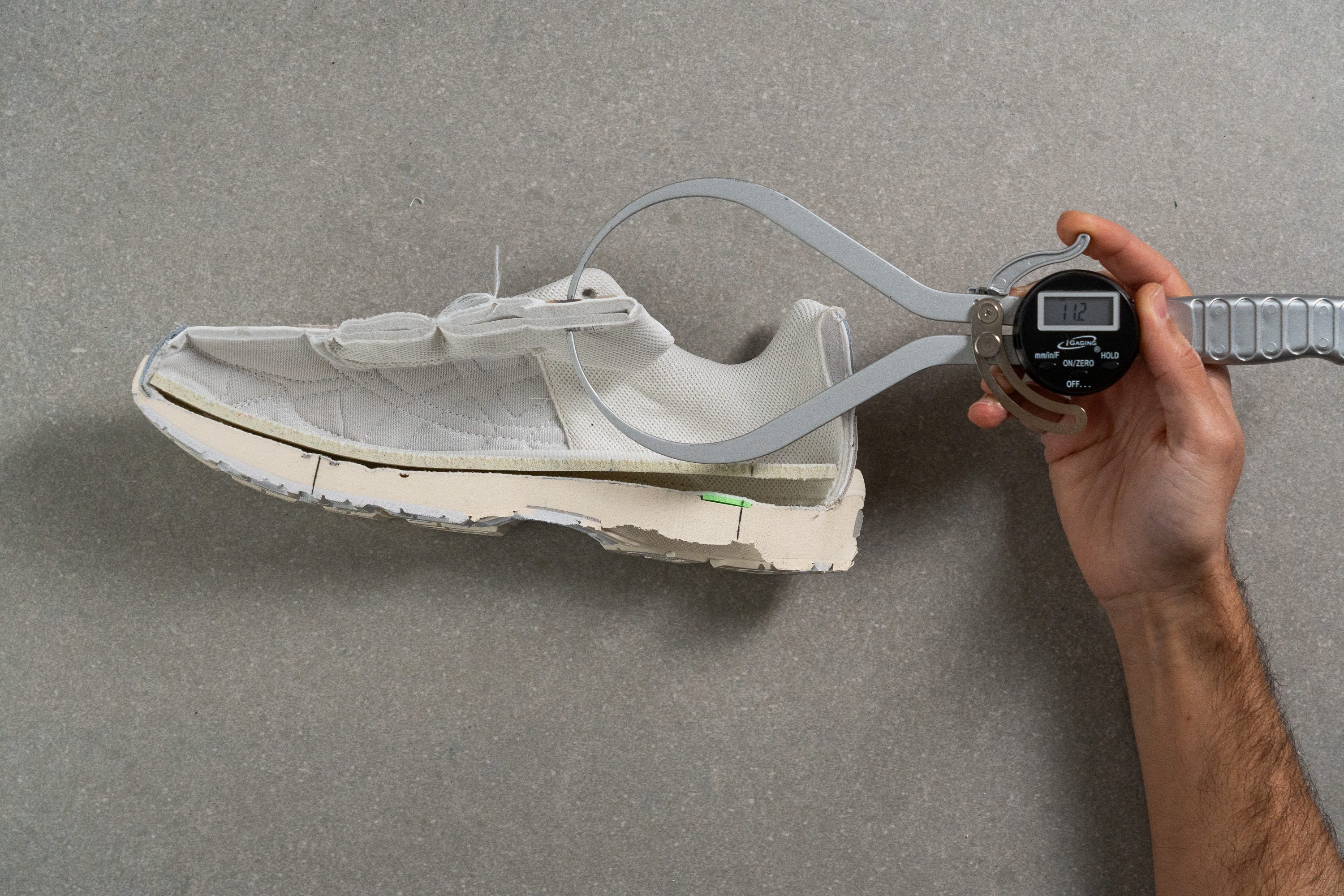
At 11.2 mm, it's thicker than most trainers. But... is it the only extra padded part of these kicks?
Of course not!
As you can see in the video, it's not just the tongue that is plush, so are the collar area and the heel! But it wasn't just us who loved this, our feet felt exactly the same. Even though this compromises breathability and, unavoidably, adds some weight to the shoe (even though this was NOT a problem in this model), it also enhances comfort.
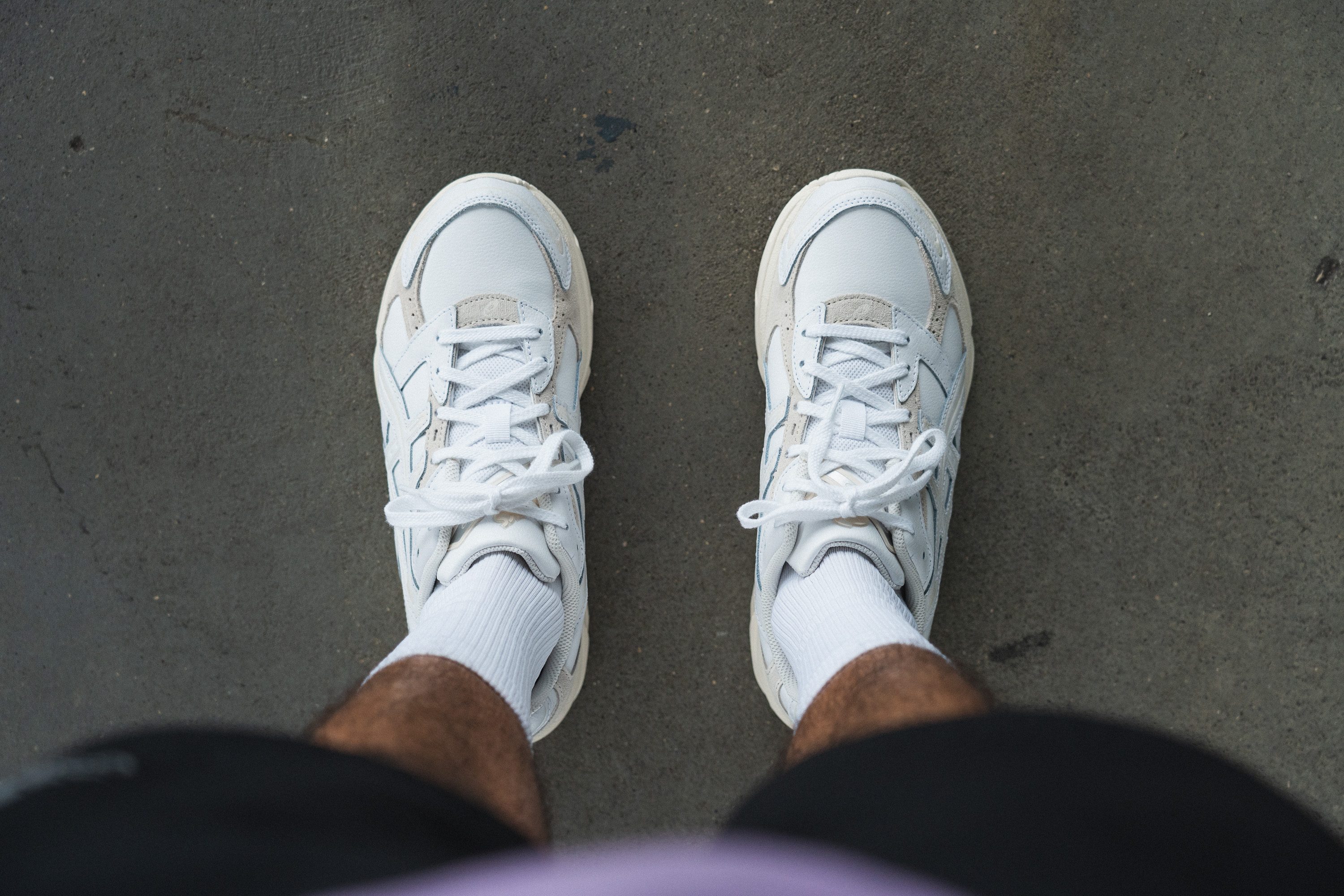
In other words, forget about having to break-in the shoe or getting uncomfortable rubs here and there. This pair is happy to keep you on your feet not only stability-wise, but also because of its comfyness!
| Gel 1130 | 11.2 mm |
| Average | 9.6 mm |
Tongue: gusset type
This ASICS doesn't have a gusseted tongue but, honestly, it's not like it needs it!
This saves it some weight, and with the lace loop it has in the middle, the tongue stays right where it should. So no scrunching, no lateral moves, and no dancing around.
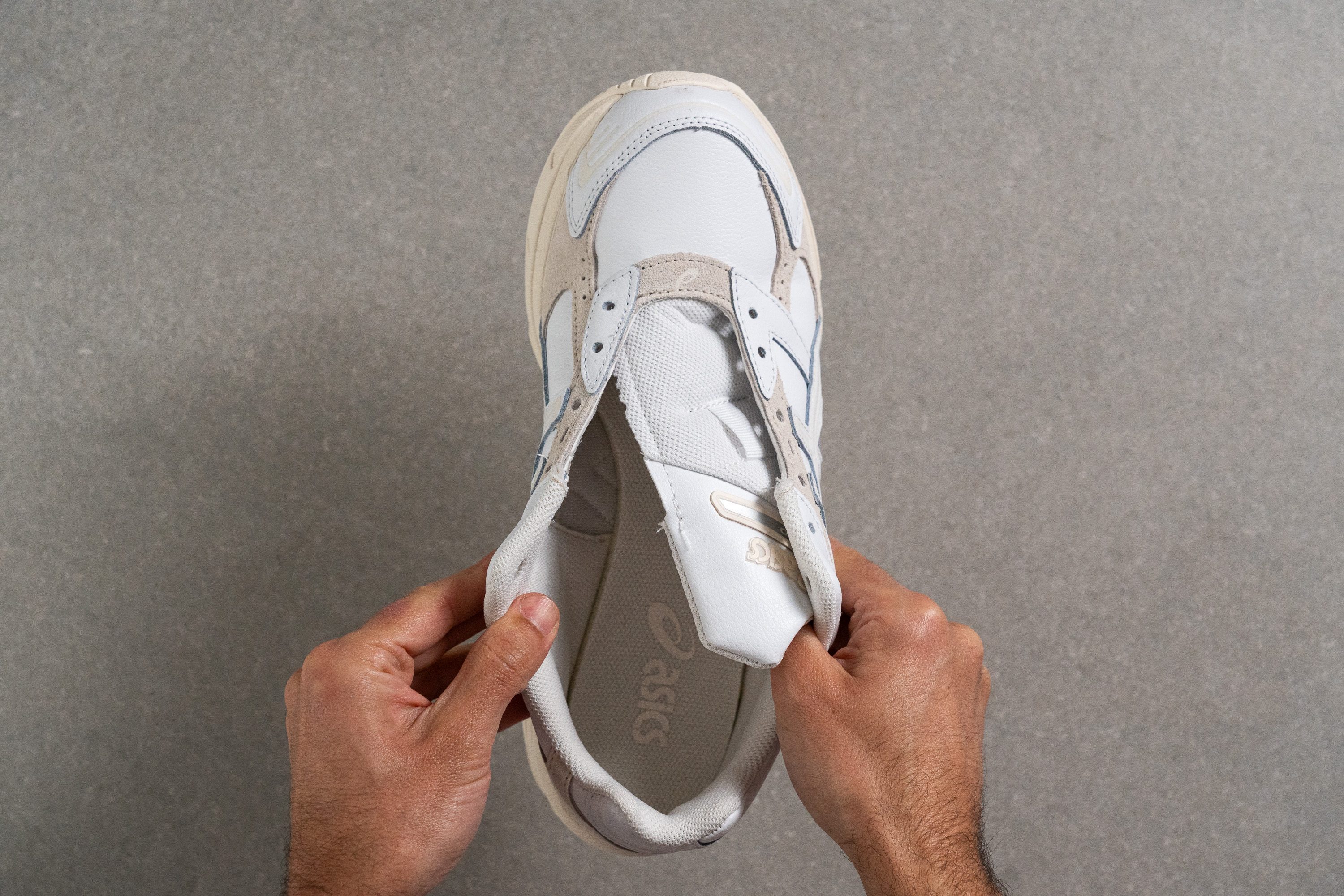
| Gel 1130 | None |
Heel tab
It doesn't have a heel tab but, honestly, we didn't feel like it needed one. The shoe has a wide opening, so we didn't have any trouble putting it on.
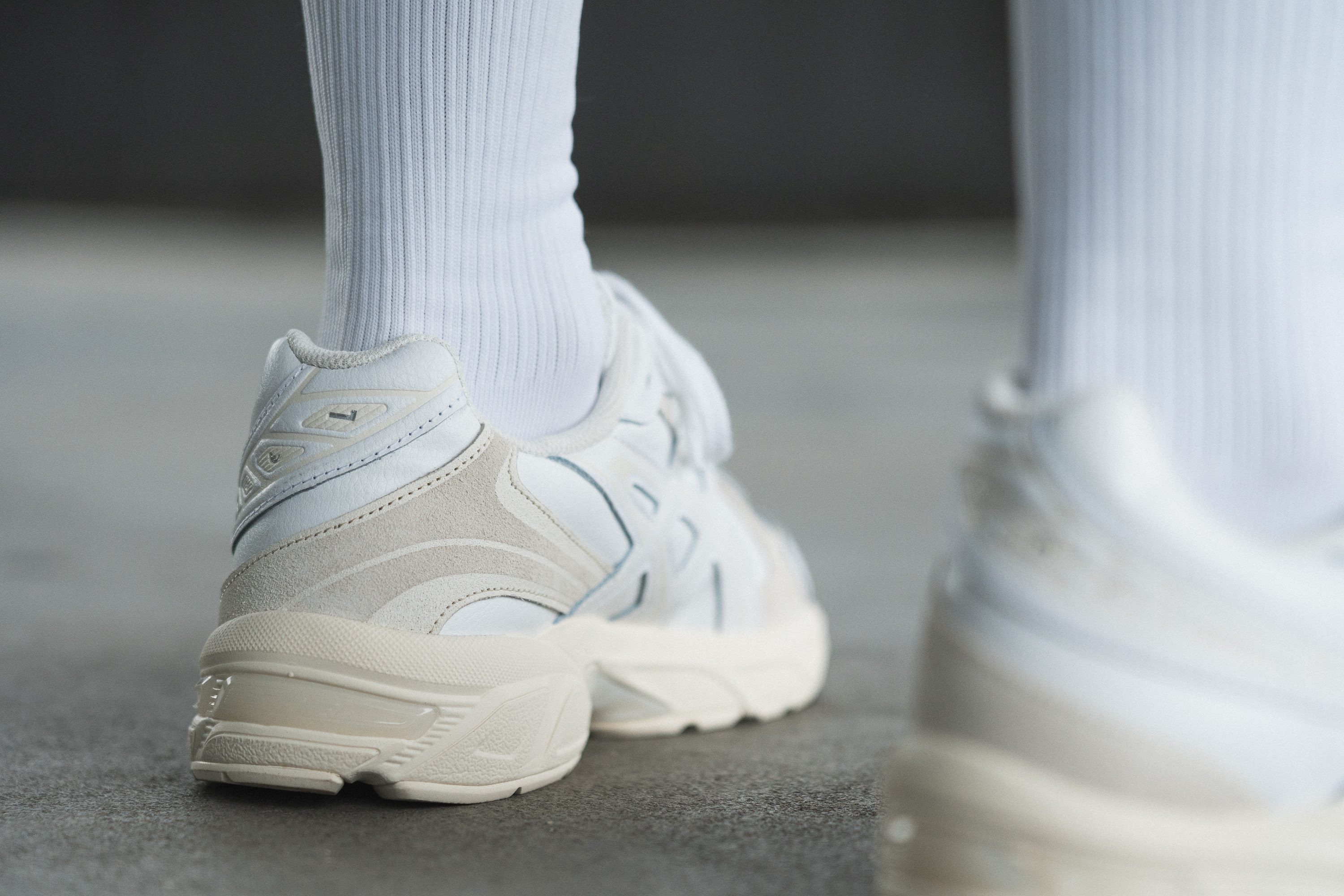
| Gel 1130 | None |

